De Profundis by unzealous
First Letter
Original SA post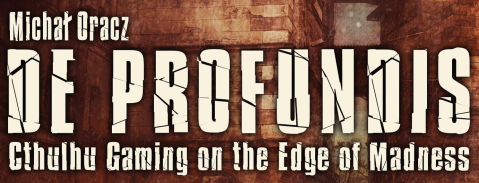
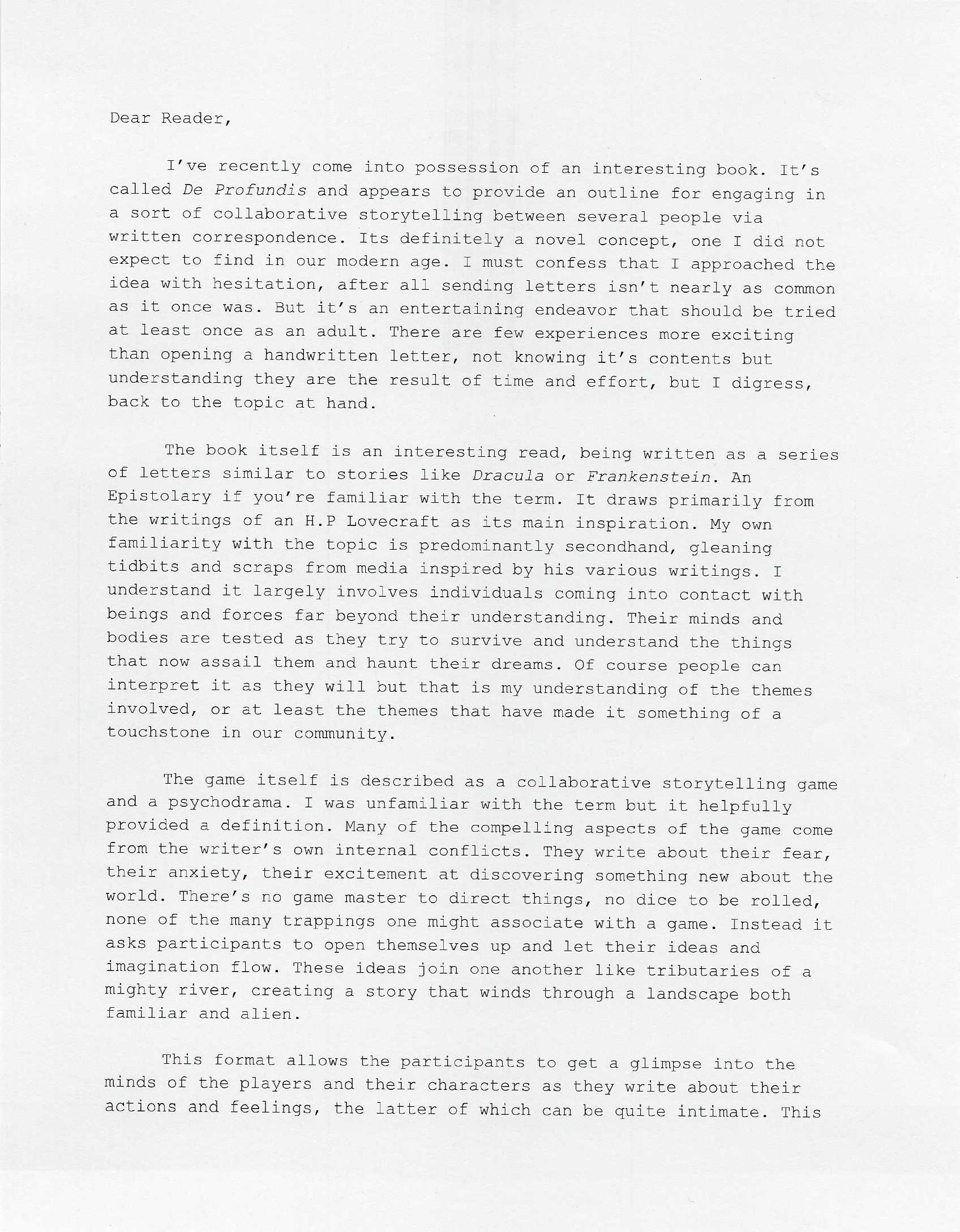
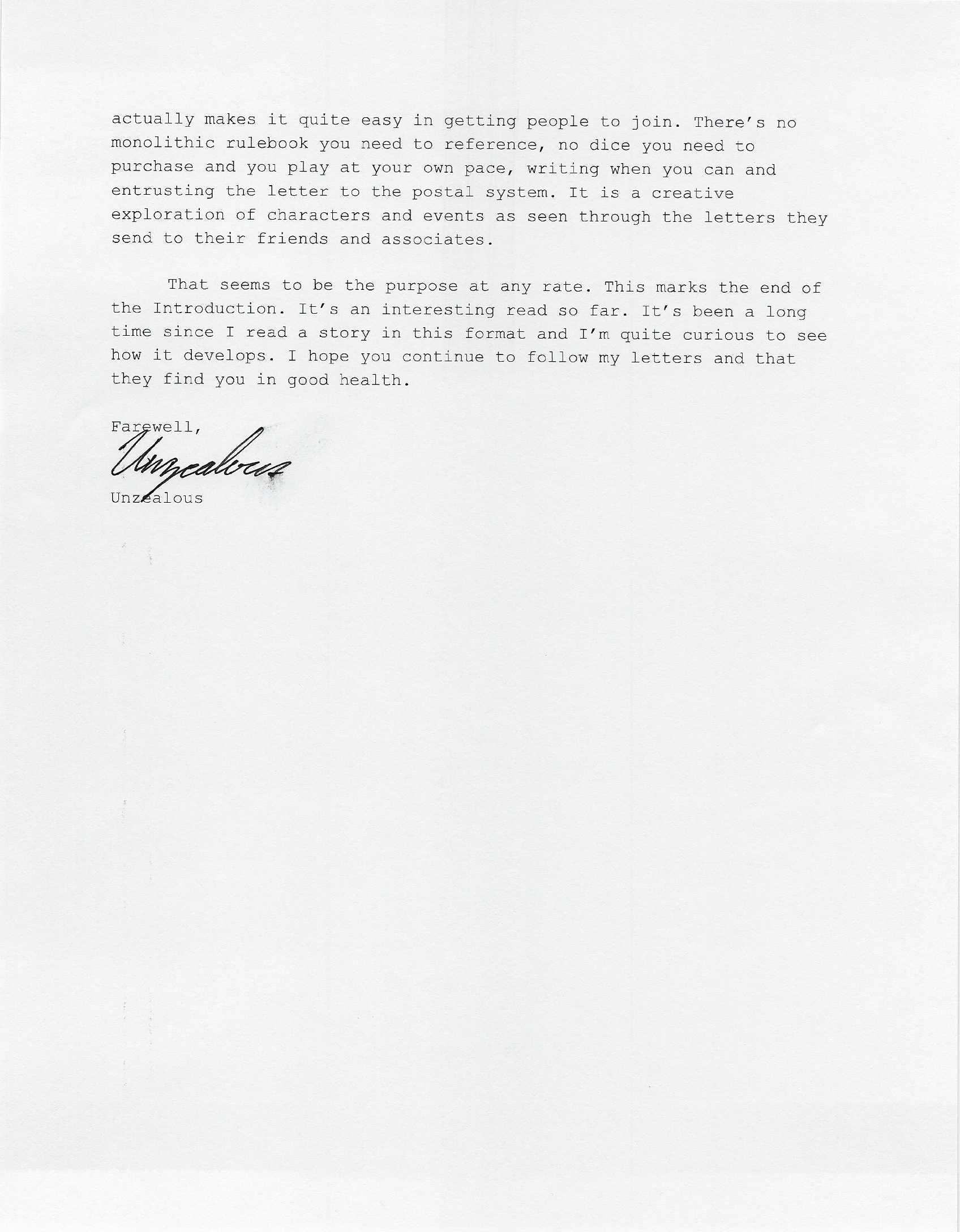
TRANSCRIPT
Dear Reader,
I’ve recently come into possession of an interesting book. It’s called De Profundis and appears to provide an outline for engaging in a sort of collaborative storytelling between several people via written correspondence. Its definitely a novel concept, one I did not expect to find in our modern age. I must confess that I approached the idea with hesitation, after all sending letters isn’t nearly as common as it once was. But it’s an entertaining endeavor that should be tried at least once as an adult. There are few experiences more exciting than opening a handwritten letter, not knowing it’s contents but understanding they are the result of time and effort, but I digress, back to the topic at hand.
The book itself is an interesting read, being written as a series of letters similar to stories like Dracula or Frankenstein. An Epistolary if you’re familiar with the term. It draws primarily from the writings of an H.P Lovecraft as its main inspiration. My own familiarity with the topic is predominantly secondhand, gleaning tidbits and scraps from media inspired by his various writings. I understand it largely involves individuals coming into contact with beings and forces far beyond their understanding. Their minds and bodies are tested as they try to survive and understand the things that now assail them and haunt their dreams. Of course people can interpret it as they will but that is my understanding of the themes involved, or at least the themes that have made it something of a touchstone in our community.
The game itself is described as a collaborative storytelling game and a psychodrama. I was unfamiliar with the term but it helpfully provided a definition. Many of the compelling aspects of the game come from the writer’s own internal conflicts. They write about their fear, their anxiety, their excitement at discovering something new about the world. There’s no game master to direct things, no dice to be rolled, none of the many trappings one might associate with a game. Instead it asks participants to open themselves up and let their ideas and imagination flow. These ideas join one another like tributaries of a mighty river, creating a story that winds through a landscape both familiar and alien.
This format allows the participants to get a glimpse into the minds of the players and their characters as they write about their actions and feelings, the latter of which can be quite intimate. This actually makes it quite easy in getting people to join. There’s no monolithic rulebook you need to reference, no dice you need to purchase and you play at your own pace, writing when you can and entrusting the letter to the postal system. It is a creative exploration of characters and events as seen through the letters they send to their friends and associates.
That seems to be the purpose at any rate. This marks the end of the Introduction. It’s an interesting read so far. It’s been a long time since I read a story in this format and I’m quite curious to see how it develops. I hope you continue to follow my letters and that they find you in good health.
Farewell,
Unzealous
Second Letter
Original SA post
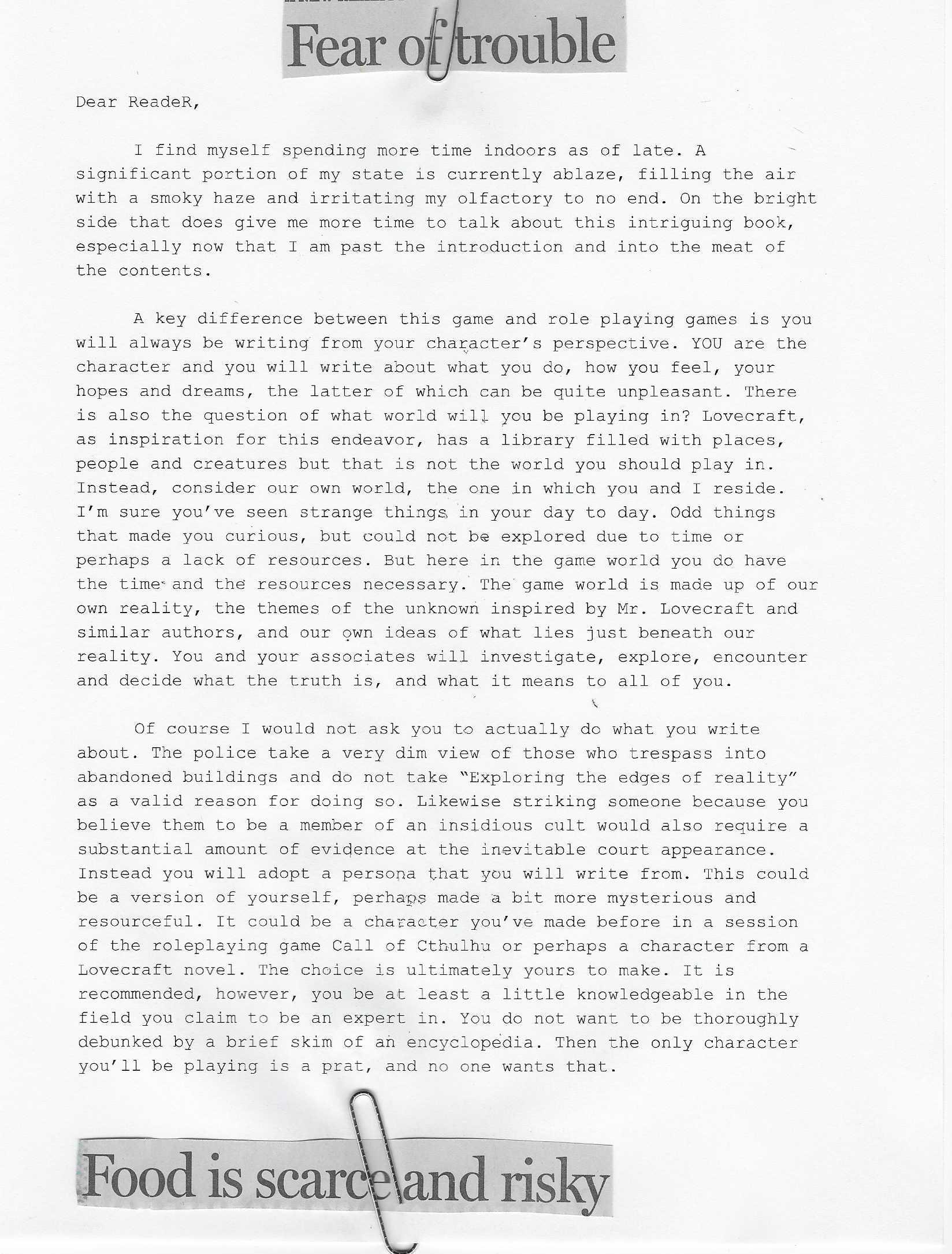
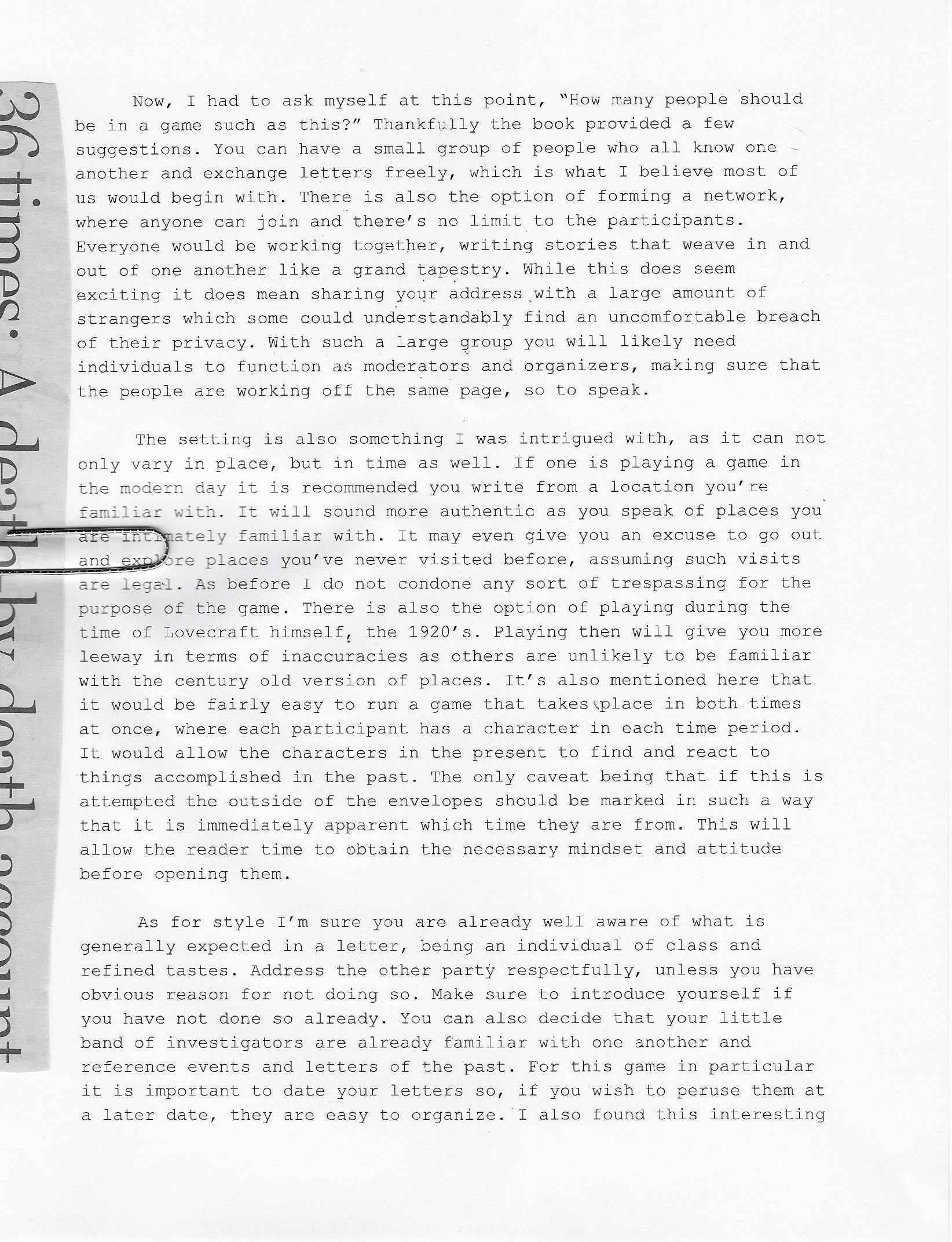
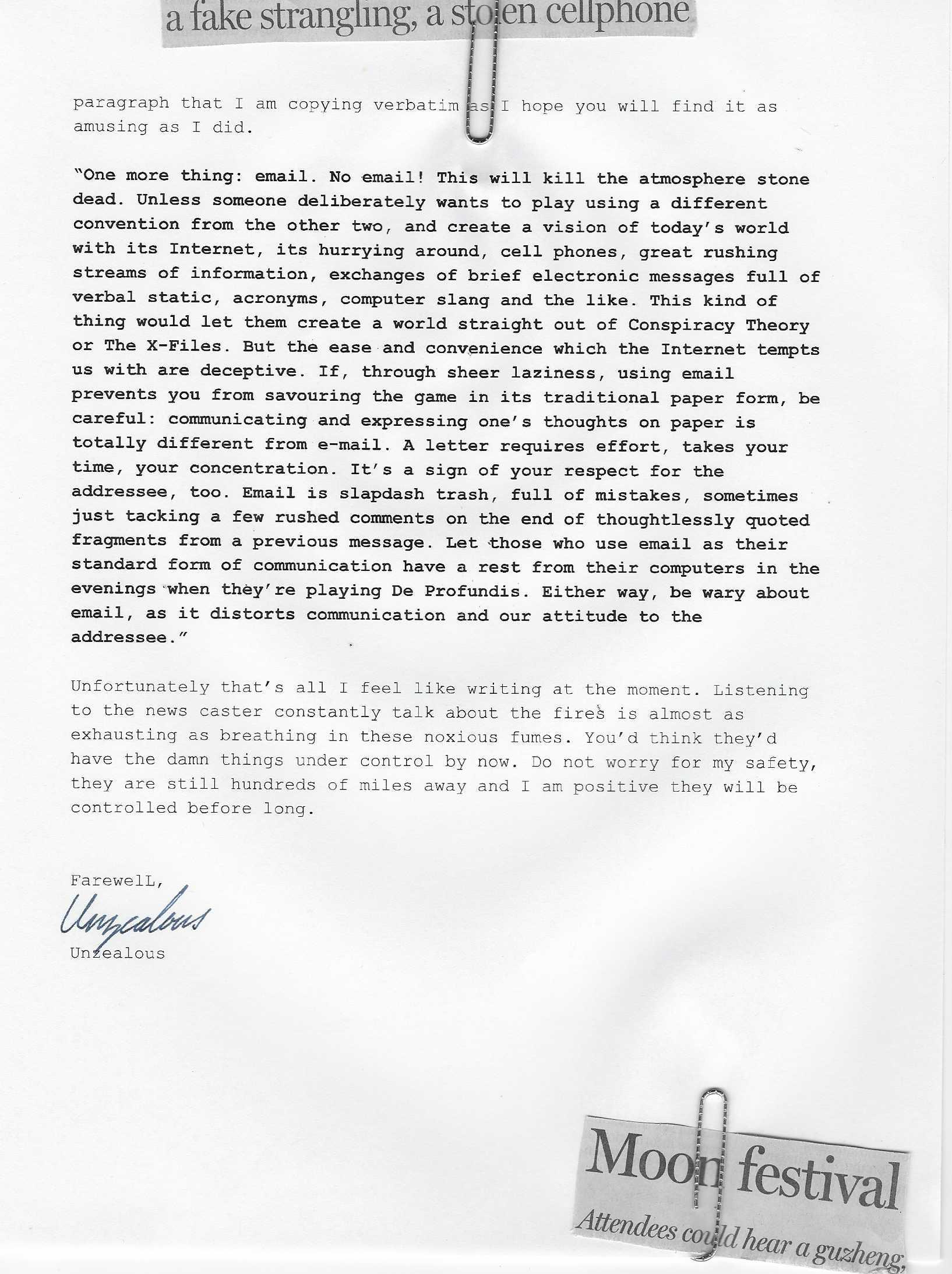
TRANSCRIPT:
Dear ReadeR,
I find myself spending more time indoors as of late. A significant portion of my state is currently ablaze, filling the air with a smoky haze and irritating my olfactory to no end. On the bright side that does give me more time to talk about this intriguing book, especially now that I am past the introduction and into the meat of the contents.
A key difference between this game and role playing games is you will always be writing from your character’s perspective. YOU are the character and you will write about what you do, how you feel, your hopes and dreams, the latter of which can be quite unpleasant. There is also the question of what world will you be playing in? Lovecraft, as inspiration for this endeavor, has a library filled with places, people and creatures but that is not the world you should play in. Instead, consider our own world, the one in which you and I reside. I’m sure you’ve seen strange things in your day to day. Odd things that made you curious, but could not be explored due to time or perhaps a lack of resources. But here in the game world you do have the time and the resources necessary. The game world is made up of our own reality, the themes of the unknown inspired by Mr. Lovecraft and similar authors, and our own ideas of what lies just beneath our reality. You and your associates will investigate, explore, encounter and decide what the truth is, and what it means to all of you.
Of course I would not ask you to actually do what you write about. The police take a very dim view of those who trespass into abandoned buildings and do not take “Exploring the edges of reality” as a valid reason for doing so. Likewise striking someone because you believe them to be a member of an insidious cult would also require a substantial amount of evidence at the inevitable court appearance. Instead you will adopt a persona that you will write from. This could be a version of yourself, perhaps made a bit more mysterious and resourceful. It could be a character you’ve made before in a session of the roleplaying game Call of Cthulhu or perhaps a character from a Lovecraft novel. The choice is ultimately yours to make. It is recommended, however, you be at least a little knowledgeable in the field you claim to be an expert in. You do not want to be thoroughly debunked by a brief skim of an encyclopedia. Then the only character you’ll be playing is a prat, and no one wants that.
Now, I had to ask myself at this point, “How many people should be in a game such as this?” Thankfully the book provided a few suggestions. You can have a small group of people who all know one another and exchange letters freely, which is what I believe most of us would begin with. There is also the option of forming a network, where anyone can join and there’s no limit to the participants. Everyone would be working together, writing stories that weave in and out of one another like a grand tapestry. While this does seem exciting it does mean sharing your address with a large amount of strangers which some could understandably find an uncomfortable breach of their privacy. With such a large group you will likely need individuals to function as moderators and organizers, making sure that the people are working off the same page, so to speak.
The setting is also something I was intrigued with, as it can not only vary in place, but in time as well. If one is playing a game in the modern day it is recommended you write from a location you’re familiar with. It will sound more authentic as you speak of places you are intimately familiar with. It may even give you an excuse to go out and explore places you’ve never visited before, assuming such visits are legal. As before I do not condone any sort of trespassing for the purpose of the game. There is also the option of playing during the time of Lovecraft himself, the 1920’s. Playing then will give you more leeway in terms of inaccuracies as others are unlikely to be familiar with the century old version of places. It’s also mentioned here that it would be fairly easy to run a game that takes place in both times at once, where each participant has a character in each time period. It would allow the characters in the present to find and react to things accomplished in the past. The only caveat being that if this is attempted the outside of the envelopes should be marked in such a way that it is immediately apparent which time they are from. This will allow the reader time to obtain the necessary mindset and attitude before opening them.
As for style I’m sure you are already well aware of what is generally expected in a letter, being an individual of class and refined tastes. Address the other party respectfully, unless you have obvious reason for not doing so. Make sure to introduce yourself if you have not done so already. You can also decide that your little band of investigators are already familiar with one another and reference events and letters of the past. For this game in particular it is important to date your letters so, if you wish to peruse them at a later date, they are easy to organize. I also found this interesting paragraph that I am copying verbatim as I hope you will find it as amusing as I did.
“One more thing: email. No email! This will kill the atmosphere stone dead. Unless someone deliberately wants to play using a different convention from the other two, and create a vision of today’s world with its Internet, its hurrying around, cell phones, great rushing streams of information, exchanges of brief electronic messages full of verbal static, acronyms, computer slang and the like. This kind of thing would let them create a world straight out of Conspiracy Theory or The X-Files. But the ease and convenience which the Internet tempts us with are deceptive. If, through sheer laziness, using email prevents you from savouring the game in its traditional paper form, be careful: communicating and expressing one’s thoughts on paper is totally different from e-mail. A letter requires effort, takes your time, your concentration. It’s a sign of your respect for the addressee, too. Email is slapdash trash, full of mistakes, sometimes just tacking a few rushed comments on the end of thoughtlessly quoted fragments from a previous message. Let those who use email as their standard form of communication have a rest from their computers in the evenings when they’re playing De Profundis. Either way, be wary about email, as it distorts communication and our attitude to the addressee.”
Unfortunately that’s all I feel like writing at the moment. Listening to the news caster constantly talk about the fires is almost as exhausting as breathing in these noxious fumes. You’d think they’d have the damn things under control by now. Do not worry for my safety, they are still hundreds of miles away and I am positive they will be controlled before long.
FarewelL,
Unzealous
Third Letter
Original SA post
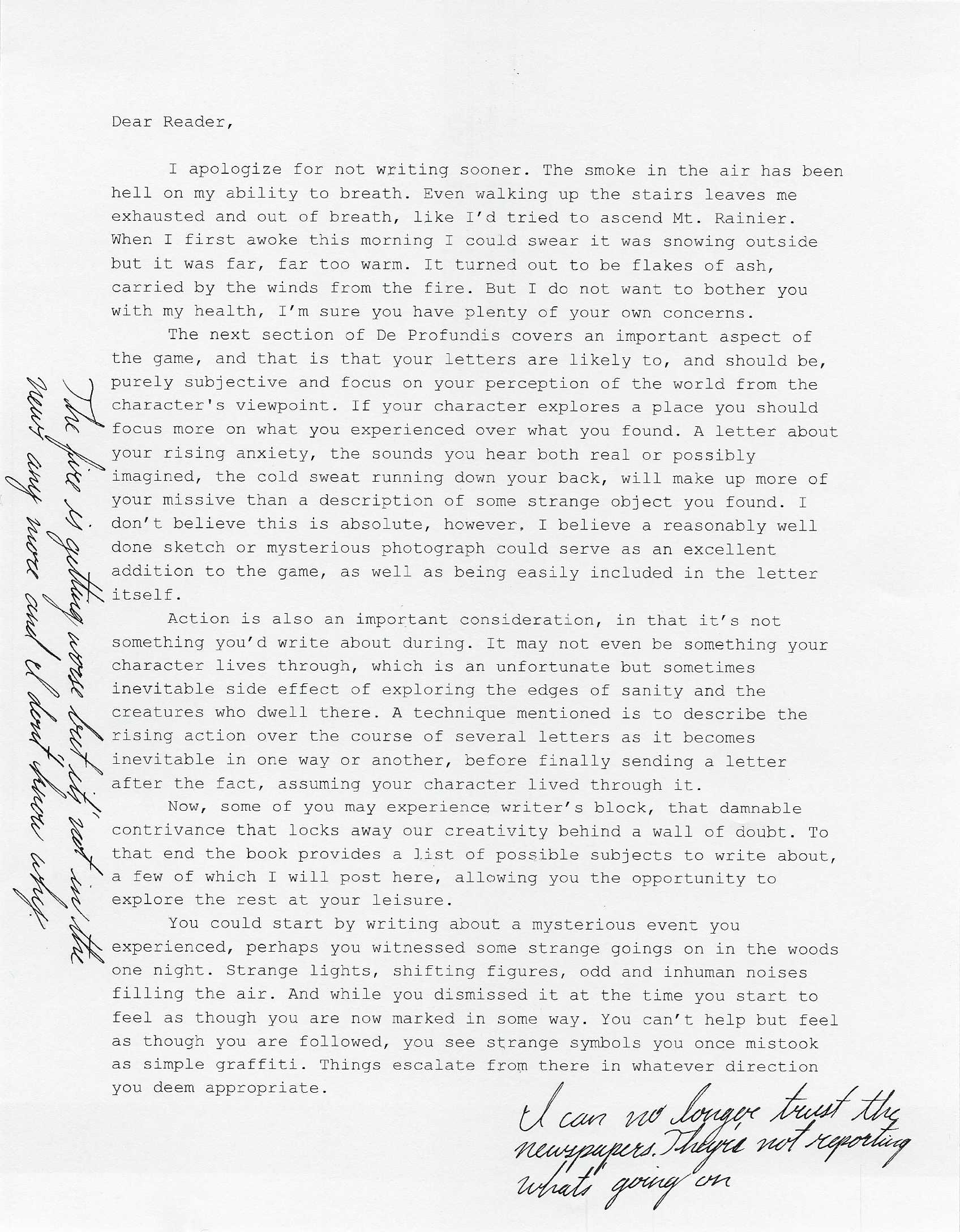
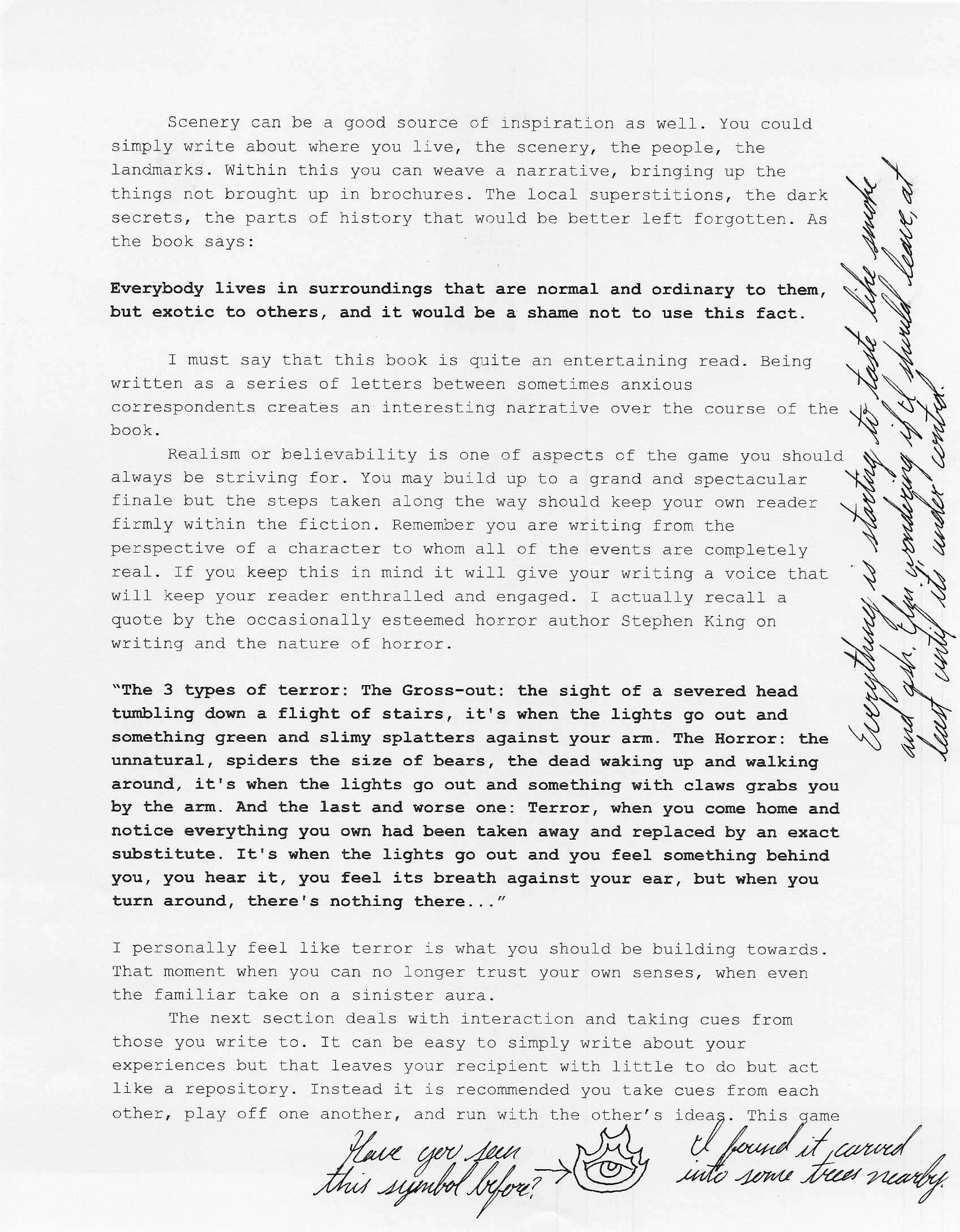
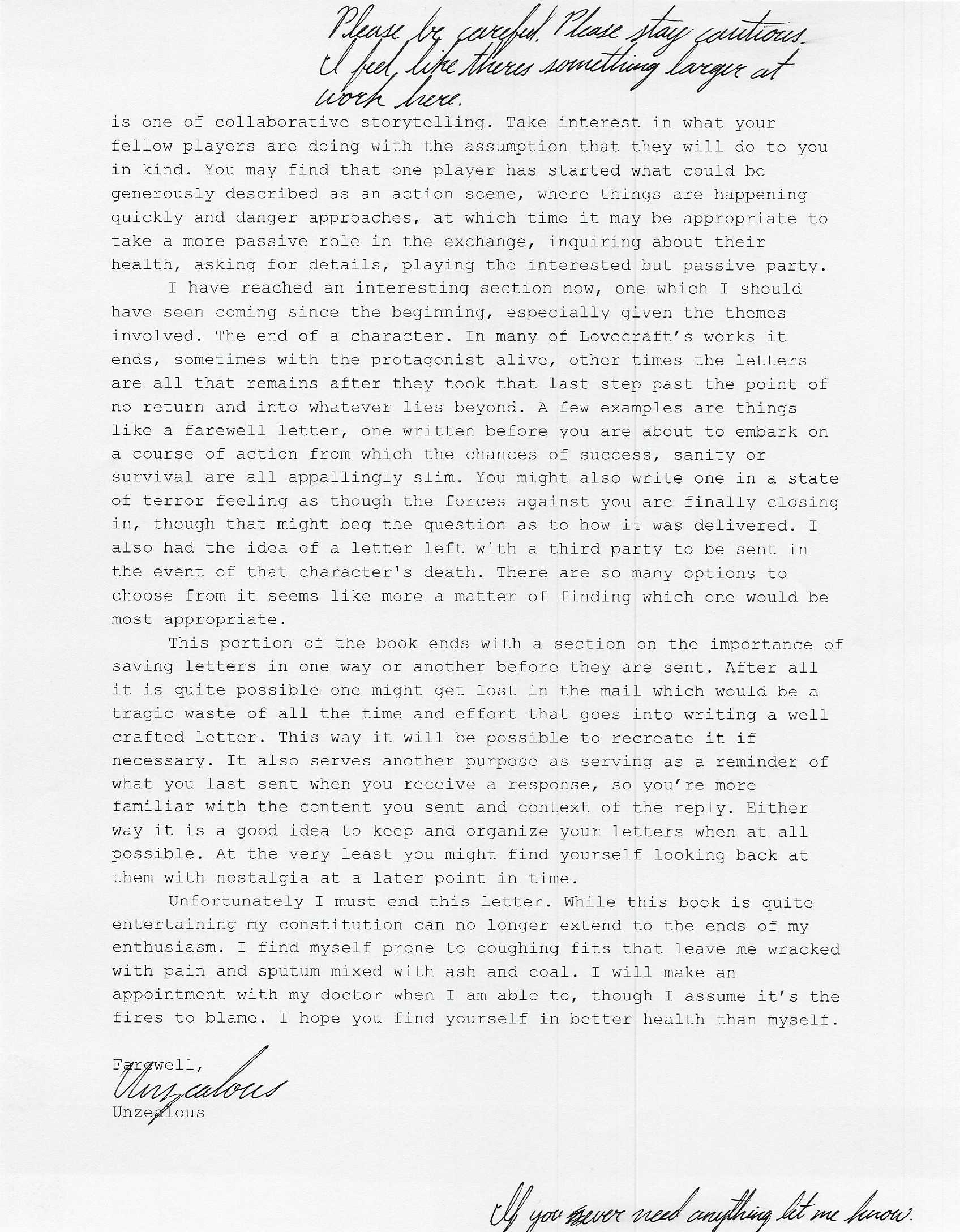
Transcript:
Dear Reader,
I apologize for not writing sooner. The smoke in the air has been hell on my ability to breath. Even walking up the stairs leaves me exhausted and out of breath, like I’d tried to ascend Mt. Rainier. When I first awoke this morning I could swear it was snowing outside but it was far, far too warm. It turned out to be flakes of ash, carried by the winds from the fire. But I do not want to bother you with my health, I’m sure you have plenty of your own concerns.
The next section of De Profundis covers an important aspect of the game, and that is that your letters are likely to, and should be, purely subjective and focus on your perception of the world from the character's viewpoint. If your character explores a place you should focus more on what you experienced over what you found. A letter about your rising anxiety, the sounds you hear both real or possibly imagined, the cold sweat running down your back, will make up more of your missive than a description of some strange object you found. I don’t believe this is absolute, however. I believe a reasonably well done sketch or mysterious photograph could serve as an excellent addition to the game, as well as being easily included in the letter itself.
Action is also an important consideration, in that it’s not something you’d write about during. It may not even be something your character lives through, which is an unfortunate but sometimes inevitable side effect of exploring the edges of sanity and the creatures who dwell there. A technique mentioned is to describe the rising action over the course of several letters as it becomes inevitable in one way or another, before finally sending a letter after the fact, assuming your character lived through it.
Now, some of you may experience writer’s block, that damnable contrivance that locks away our creativity behind a wall of doubt. To that end the book provides a list of possible subjects to write about, a few of which I will post here, allowing you the opportunity to explore the rest at your leisure.
You could start by writing about a mysterious event you experienced, perhaps you witnessed some strange goings on in the woods one night. Strange lights, shifting figures, odd and inhuman noises filling the air. And while you dismissed it at the time you start to feel as though you are now marked in some way. You can’t help but feel as though you are followed, you see strange symbols you once mistook as simple graffiti. Things escalate from there in whatever direction you deem appropriate.
Scenery can be a good source of inspiration as well. You could simply write about where you live, the scenery, the people, the landmarks. Within this you can weave a narrative, bringing up the things not brought up in brochures. The local superstitions, the dark secrets, the parts of history that would be better left forgotten. As the book says:
Everybody lives in surroundings that are normal and ordinary to them, but exotic to others, and it would be a shame not to use this fact.
I must say that this book is quite an entertaining read. Being written as a series of letters between sometimes anxious correspondents creates an interesting narrative over the course of the book.
Realism or believability is one of aspects of the game you should always be striving for. You may build up to a grand and spectacular finale but the steps taken along the way should keep your own reader firmly within the fiction. Remember you are writing from the perspective of a character to whom all of the events are completely real. If you keep this in mind it will give your writing a voice that will keep your reader enthralled and engaged. I actually recall a quote by the occasionally esteemed horror author Stephen King on writing and the nature of horror.
“The 3 types of terror: The Gross-out: the sight of a severed head tumbling down a flight of stairs, it's when the lights go out and something green and slimy splatters against your arm. The Horror: the unnatural, spiders the size of bears, the dead waking up and walking around, it's when the lights go out and something with claws grabs you by the arm. And the last and worse one: Terror, when you come home and notice everything you own had been taken away and replaced by an exact substitute. It's when the lights go out and you feel something behind you, you hear it, you feel its breath against your ear, but when you turn around, there's nothing there...”
I personally feel like terror is what you should be building towards. That moment when you can no longer trust your own senses, when even the familiar take on a sinister aura.
The next section deals with interaction and taking cues from those you write to. It can be easy to simply write about your experiences but that leaves your recipient with little to do but act like a repository. Instead it is recommended you take cues from each other, play off one another, and run with the other’s ideas. This game is one of collaborative storytelling. Take interest in what your fellow players are doing with the assumption that they will do to you in kind. You may find that one player has started what could be generously described as an action scene, where things are happening quickly and danger approaches, at which time it may be appropriate to take a more passive role in the exchange, inquiring about their health, asking for details, playing the interested but passive party.
I have reached an interesting section now, one which I should have seen coming since the beginning, especially given the themes involved. The end of a character. In many of Lovecraft’s works it ends, sometimes with the protagonist alive, other times the letters are all that remains after they took that last step past the point of no return and into whatever lies beyond. A few examples are things like a farewell letter, one written before you are about to embark on a course of action from which the chances of success, sanity or survival are all appallingly slim. You might also write one in a state of terror feeling as though the forces against you are finally closing in, though that might beg the question as to how it was delivered. I also had the idea of a letter left with a third party to be sent in the event of that character's death. There are so many options to choose from it seems like more a matter of finding which one would be most appropriate.
This portion of the book ends with a section on the importance of saving letters in one way or another before they are sent. After all it is quite possible one might get lost in the mail which would be a tragic waste of all the time and effort that goes into writing a well crafted letter. This way it will be possible to recreate it if necessary. It also serves another purpose as serving as a reminder of what you last sent when you receive a response, so you’re more familiar with the content you sent and context of the reply. Either way it is a good idea to keep and organize your letters when at all possible. At the very least you might find yourself looking back at them with nostalgia at a later point in time.
Unfortunately I must end this letter. While this book is quite entertaining my constitution can no longer extend to the ends of my enthusiasm. I find myself prone to coughing fits that leave me wracked with pain and sputum mixed with ash and coal. I will make an appointment with my doctor when I am able to, though I assume it’s the fires to blame. I hope you find yourself in better health than myself.
Farewell,
Unzealous
Fourth Letter
Original SA post
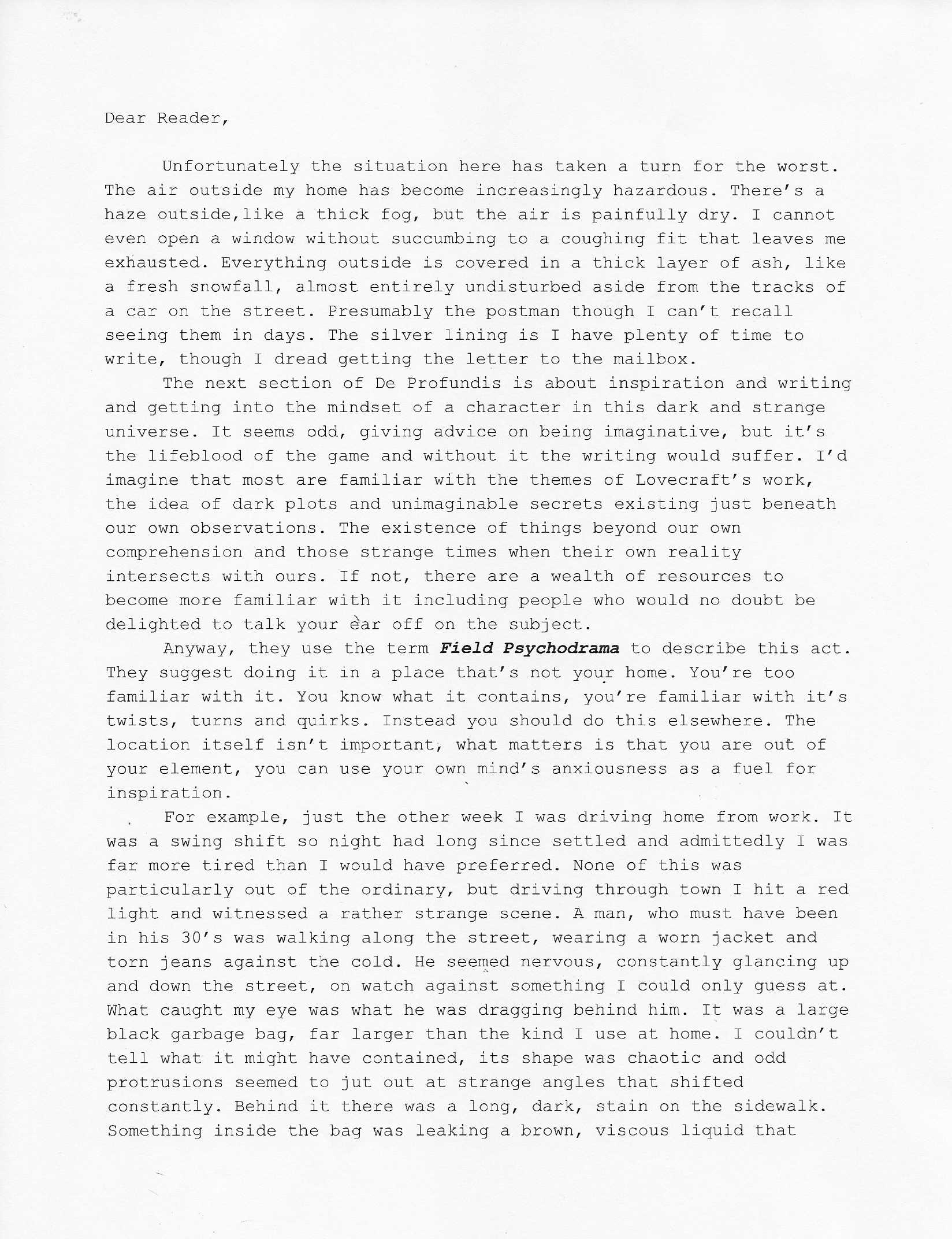
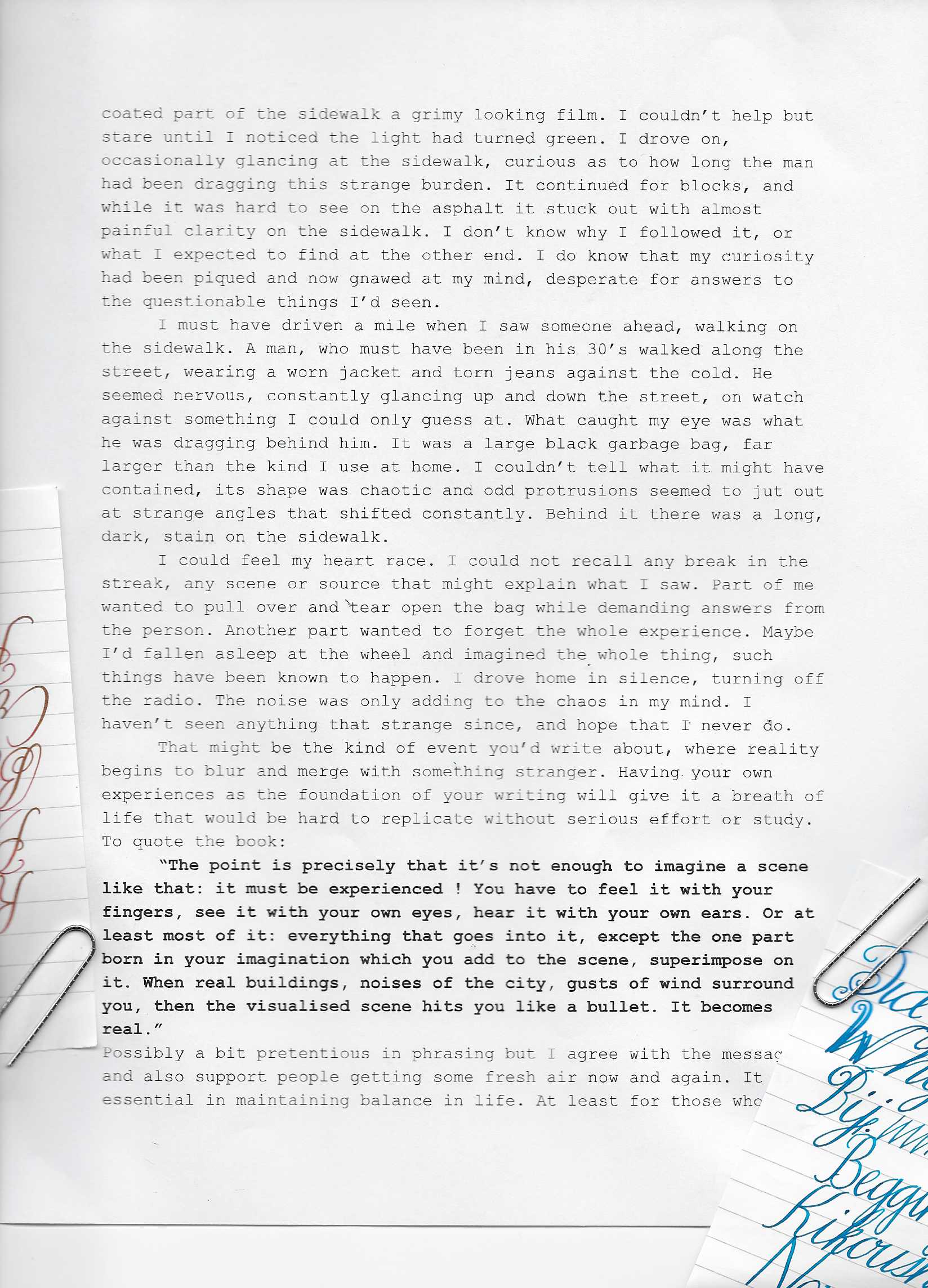
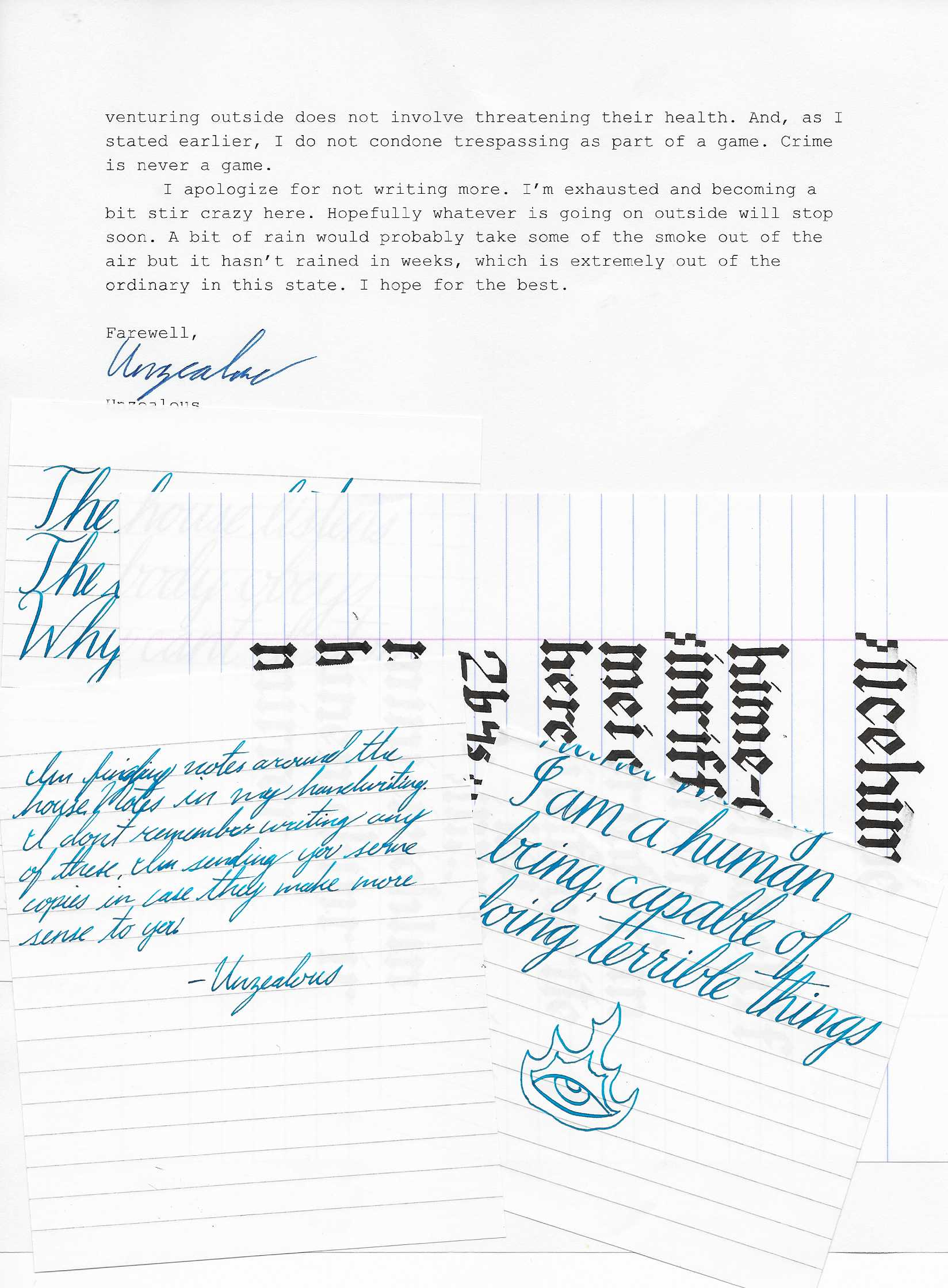
Transcript:
Dear Reader,
Unfortunately the situation here has taken a turn for the worst. The air outside my home has become increasingly hazardous. There’s a haze outside,like a thick fog, but the air is painfully dry. I cannot even open a window without succumbing to a coughing fit that leaves me exhausted. Everything outside is covered in a thick layer of ash, like a fresh snowfall, almost entirely undisturbed aside from the tracks of a car on the street. Presumably the postman though I can’t recall seeing them in days. The silver lining is I have plenty of time to write, though I dread getting the letter to the mailbox.
The next section of De Profundis is about inspiration and writing and getting into the mindset of a character in this dark and strange universe. It seems odd, giving advice on being imaginative, but it’s the lifeblood of the game and without it the writing would suffer. I’d imagine that most are familiar with the themes of Lovecraft’s work, the idea of dark plots and unimaginable secrets existing just beneath our own observations. The existence of things beyond our own comprehension and those strange times when their own reality intersects with ours. If not, there are a wealth of resources to become more familiar with it including people who would no doubt be delighted to talk your ear off on the subject.
Anyway, they use the term Field Psychodrama to describe this act. They suggest doing it in a place that’s not your home. You’re too familiar with it. You know what it contains, you’re familiar with it’s twists, turns and quirks. Instead you should do this elsewhere. The location itself isn’t important, what matters is that you are out of your element, you can use your own mind’s anxiousness as a fuel for inspiration.
For example, just the other week I was driving home from work. It was a swing shift so night had long since settled and admittedly I was far more tired than I would have preferred. None of this was particularly out of the ordinary, but driving through town I hit a red light and witnessed a rather strange scene. A man, who must have been in his 30’s was walking along the street, wearing a worn jacket and torn jeans against the cold. He seemed nervous, constantly glancing up and down the street, on watch against something I could only guess at. What caught my eye was what he was dragging behind him. It was a large black garbage bag, far larger than the kind I use at home. I couldn’t tell what it might have contained, its shape was chaotic and odd protrusions seemed to jut out at strange angles that shifted constantly. Behind it there was a long, dark, stain on the sidewalk. Something inside the bag was leaking a brown, viscous liquid that coated part of the sidewalk a grimy looking film. I couldn’t help but stare until I noticed the light had turned green. I drove on, occasionally glancing at the sidewalk, curious as to how long the man had been dragging this strange burden. It continued for blocks, and while it was hard to see on the asphalt it stuck out with almost painful clarity on the sidewalk. I don’t know why I followed it, or what I expected to find at the other end. I do know that my curiosity had been piqued and now gnawed at my mind, desperate for answers to the questionable things I’d seen.
I must have driven a mile when I saw someone ahead, walking on the sidewalk. A man, who must have been in his 30’s walked along the street, wearing a worn jacket and torn jeans against the cold. He seemed nervous, constantly glancing up and down the street, on watch against something I could only guess at. What caught my eye was what he was dragging behind him. It was a large black garbage bag, far larger than the kind I use at home. I couldn’t tell what it might have contained, its shape was chaotic and odd protrusions seemed to jut out at strange angles that shifted constantly. Behind it there was a long, dark, stain on the sidewalk.
I could feel my heart race. I could not recall any break in the streak, any scene or source that might explain what I saw. Part of me wanted to pull over and tear open the bag while demanding answers from the person. Another part wanted to forget the whole experience. Maybe I’d fallen asleep at the wheel and imagined the whole thing, such things have been known to happen. I drove home in silence, turning off the radio. The noise was only adding to the chaos in my mind. I haven’t seen anything that strange since, and hope that I never do.
That might be the kind of event you’d write about, where reality begins to blur and merge with something stranger. Having your own experiences as the foundation of your writing will give it a breath of life that would be hard to replicate without serious effort or study. To quote the book:
“The point is precisely that it’s not enough to imagine a scene like that: it must be experienced ! You have to feel it with your fingers, see it with your own eyes, hear it with your own ears. Or at least most of it: everything that goes into it, except the one part born in your imagination which you add to the scene, superimpose on it. When real buildings, noises of the city, gusts of wind surround you, then the visualised scene hits you like a bullet. It becomes real.”
Possibly a bit pretentious in phrasing but I agree with the message and also support people getting some fresh air now and again. It is essential in maintaining balance in life. At least for those whom venturing outside does not involve threatening their health. And, as I stated earlier, I do not condone trespassing as part of a game. Crime is never a game.
I apologize for not writing more. I’m exhausted and becoming a bit stir crazy here. Hopefully whatever is going on outside will stop soon. A bit of rain would probably take some of the smoke out of the air but it hasn’t rained in weeks, which is extremely out of the ordinary in this state. I hope for the best.
Farewell,
Unzealous
Fifth Letter
Original SA post
Today with a special guest letter!
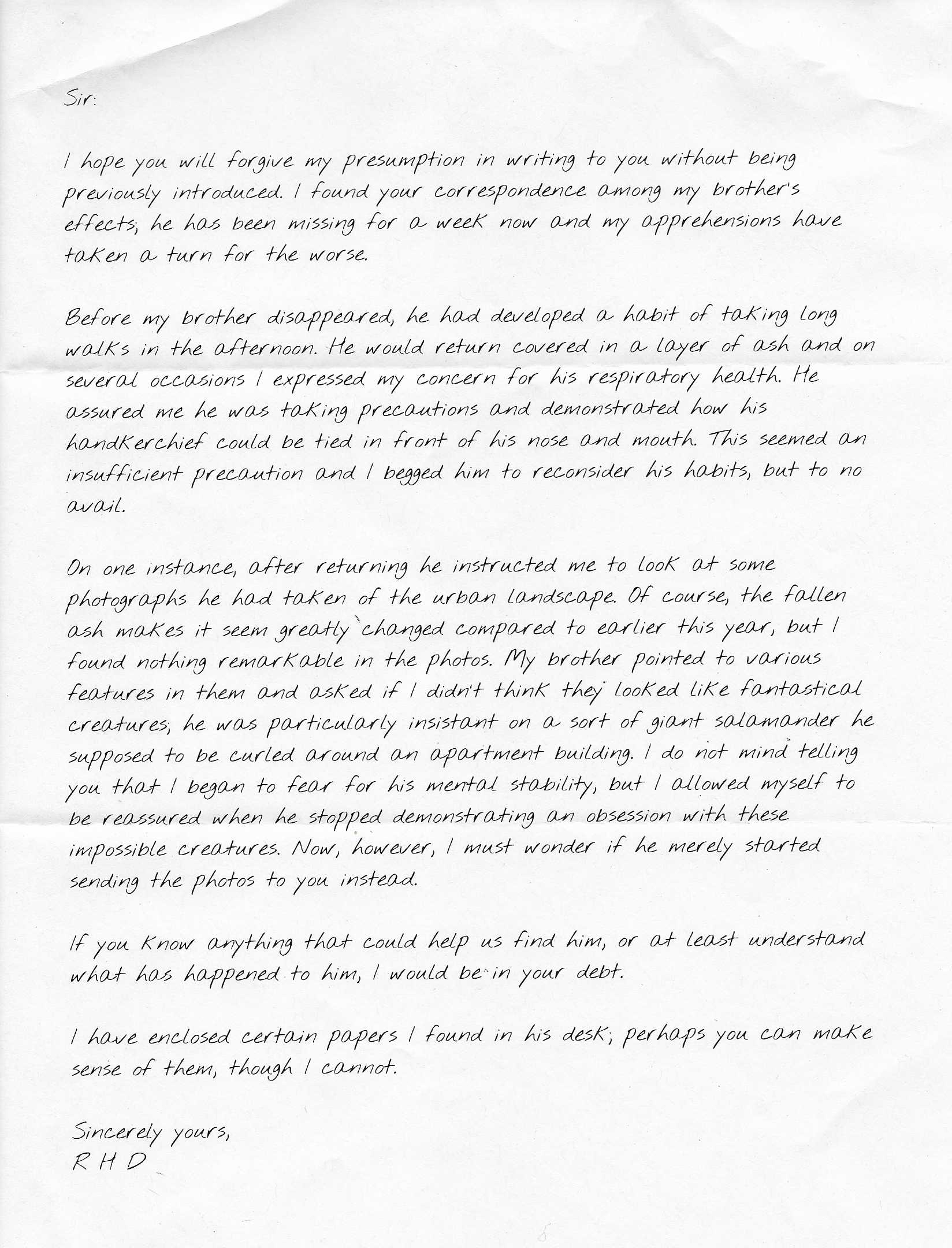
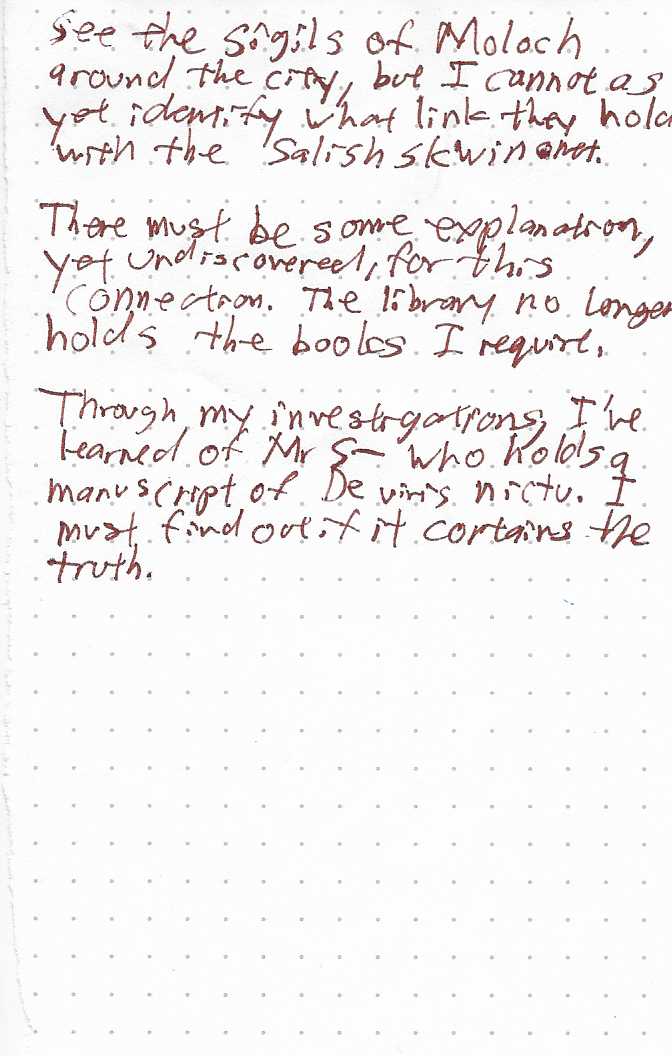
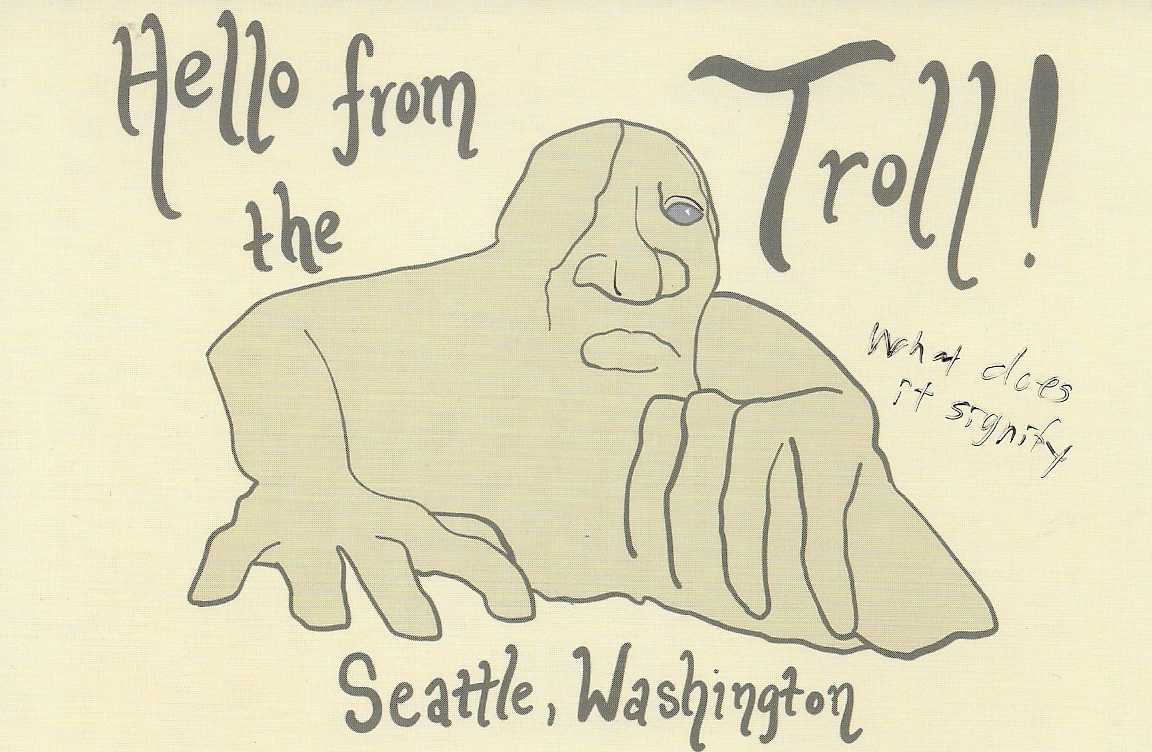
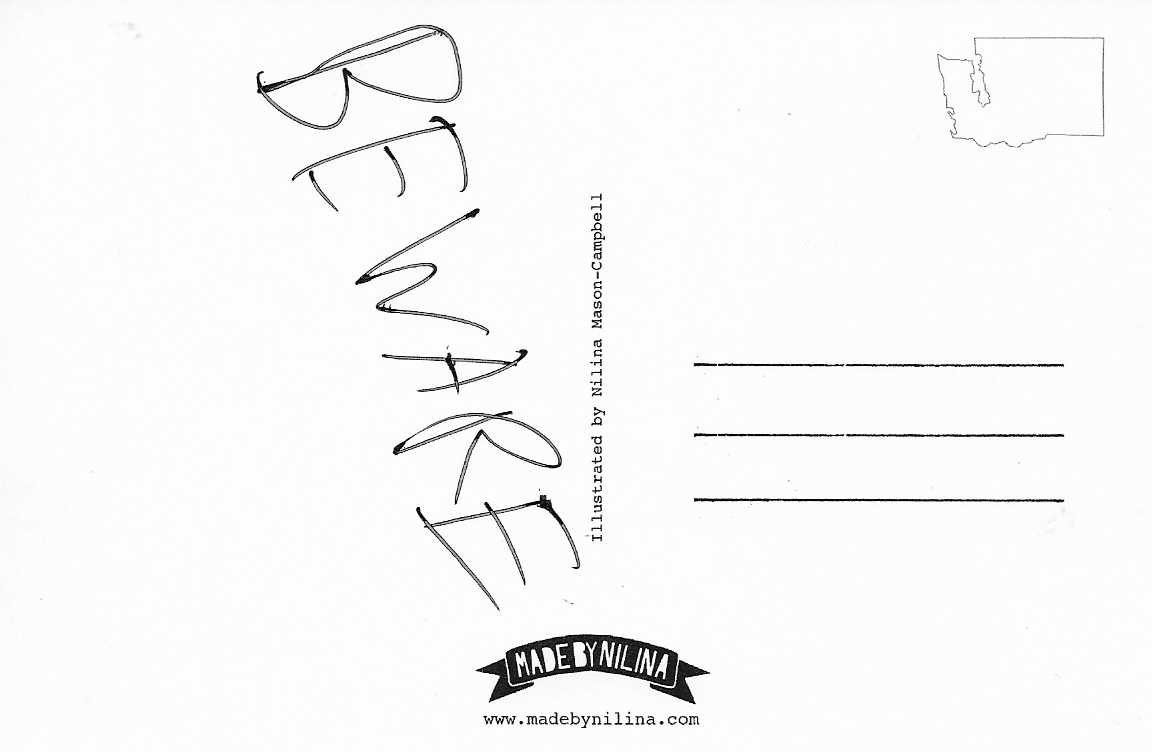

Transcript:
Sir:
I hope you will forgive my presumption in writing to you without being previously introduced. I found your correspondence among my brother’s effects; he has been missing for a week now and my apprehensions have taken a turn for the worse.
Before my brother disappeared, he had developed a habit of taking long walks in the afternoon. He would return covered in a layer of ash and on several occasions I expressed my concern for his respiratory health. He assured me he was taking precautions and demonstrated how his handkerchief could be tied in front of his nose and mouth. This seemed an insufficient precaution and I begged him to reconsider his habits, but to no avail.
On one instance, after returning he instructed me to look at some photographs he had taken of the urban landscape. Of course, the fallen ash makes it seem greatly changed compared to earlier this year, but I found nothing remarkable in the photos. My brother pointed to various features in them and asked if I didn’t think they looked like fantastical creatures; he was particularly insistant on a sort of giant salamander he supposed to be curled around an apartment building. I do not mind telling you that I began to fear for his mental stability, but I allowed myself to be reassured when he stopped demonstrating an obsession with these impossible creatures. Now, however, I must wonder if he merely started sending the photos to you instead.
If you know anything that could help us find him, or at least understand what has happened to him, I would be in your debt.
I have enclosed certain papers I found in his desk; perhaps you can make sense of them, though I cannot.
Sincerely yours,
R H D
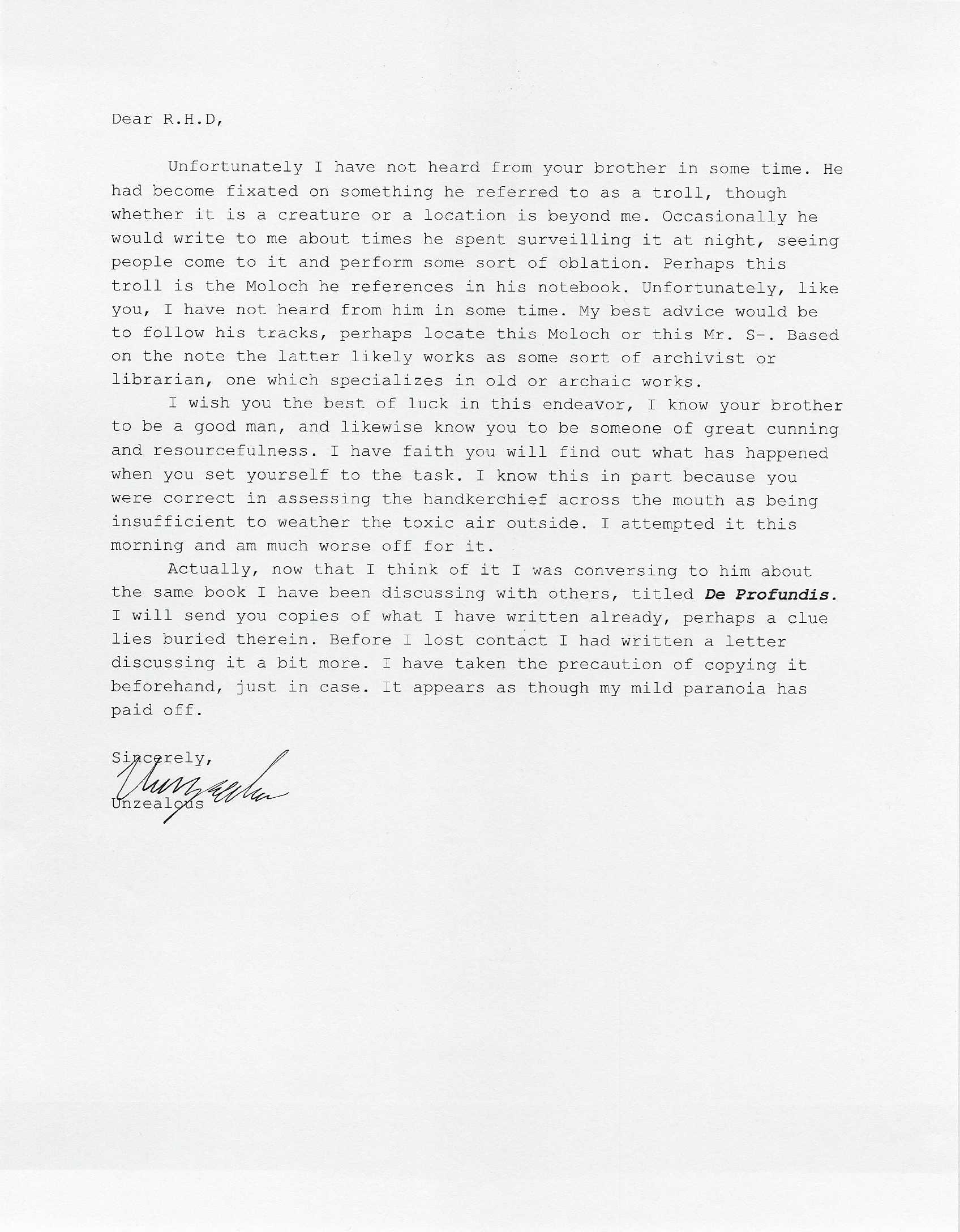
Transcript:
Dear R.H.D,
Unfortunately I have not heard from your brother in some time. He had become fixated on something he referred to as a troll, though whether it is a creature or a location is beyond me. Occasionally he would write to me about times he spent surveilling it at night, seeing people come to it and perform some sort of oblation. Perhaps this troll is the Moloch he references in his notebook. Unfortunately, like you, I have not heard from him in some time. My best advice would be to follow his tracks, perhaps locate this Moloch or this Mr. S-. Based on the note the latter likely works as some sort of archivist or librarian, one which specializes in old or archaic works.
I wish you the best of luck in this endeavor, I know your brother to be a good man, and likewise know you to be someone of great cunning and resourcefulness. I have faith you will find out what has happened when you set yourself to the task. I know this in part because you were correct in assessing the handkerchief across the mouth as being insufficient to weather the toxic air outside. I attempted it this morning and am much worse off for it.
Actually, now that I think of it I was conversing to him about the same book I have been discussing with others, titled De Profundis. I will send you copies of what I have written already, perhaps a clue lies buried therein. Before I lost contact I had written a letter discussing it a bit more. I have taken the precaution of copying it beforehand, just in case. It appears as though my mild paranoia has paid off.
Sincerely,
Unzealous
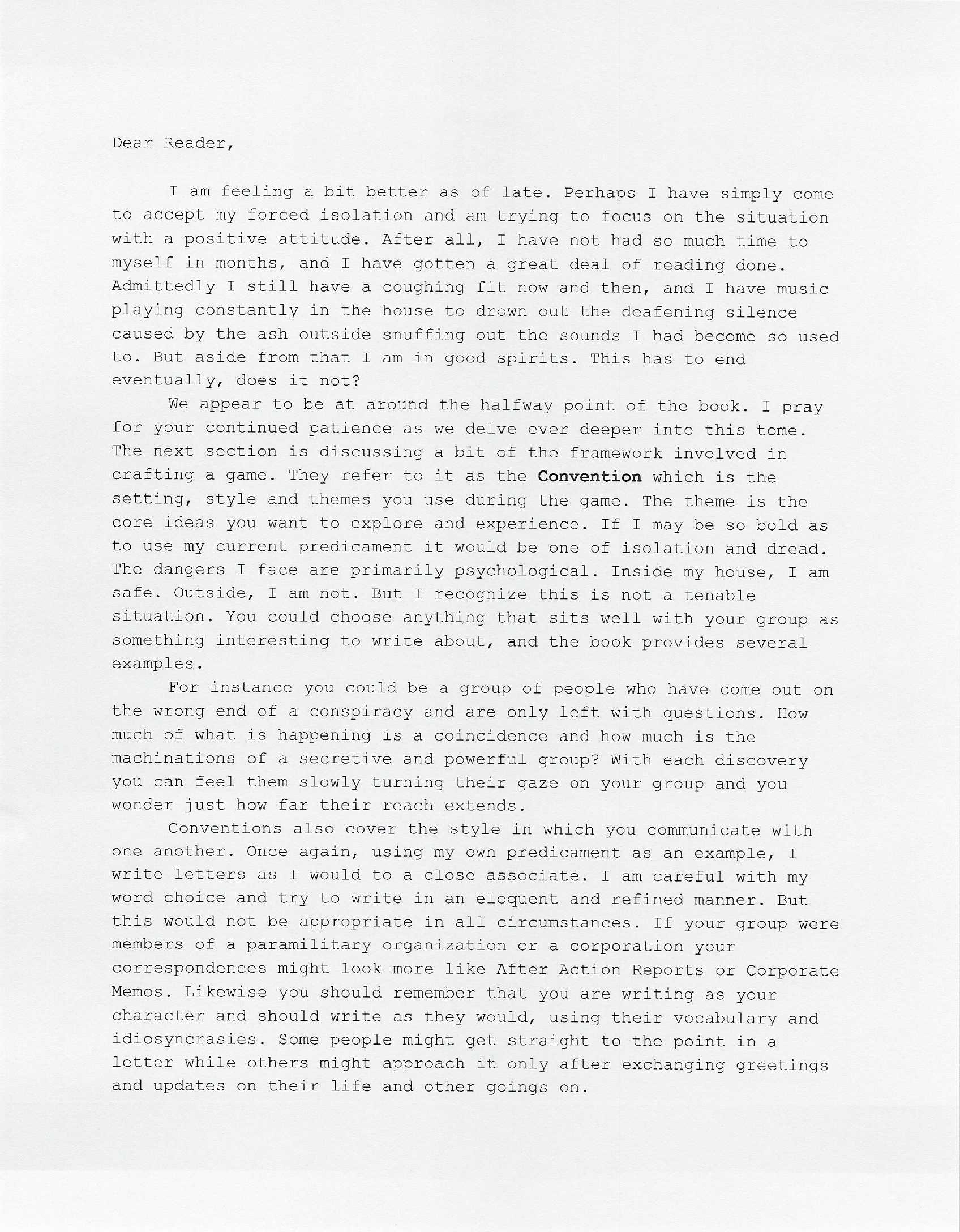
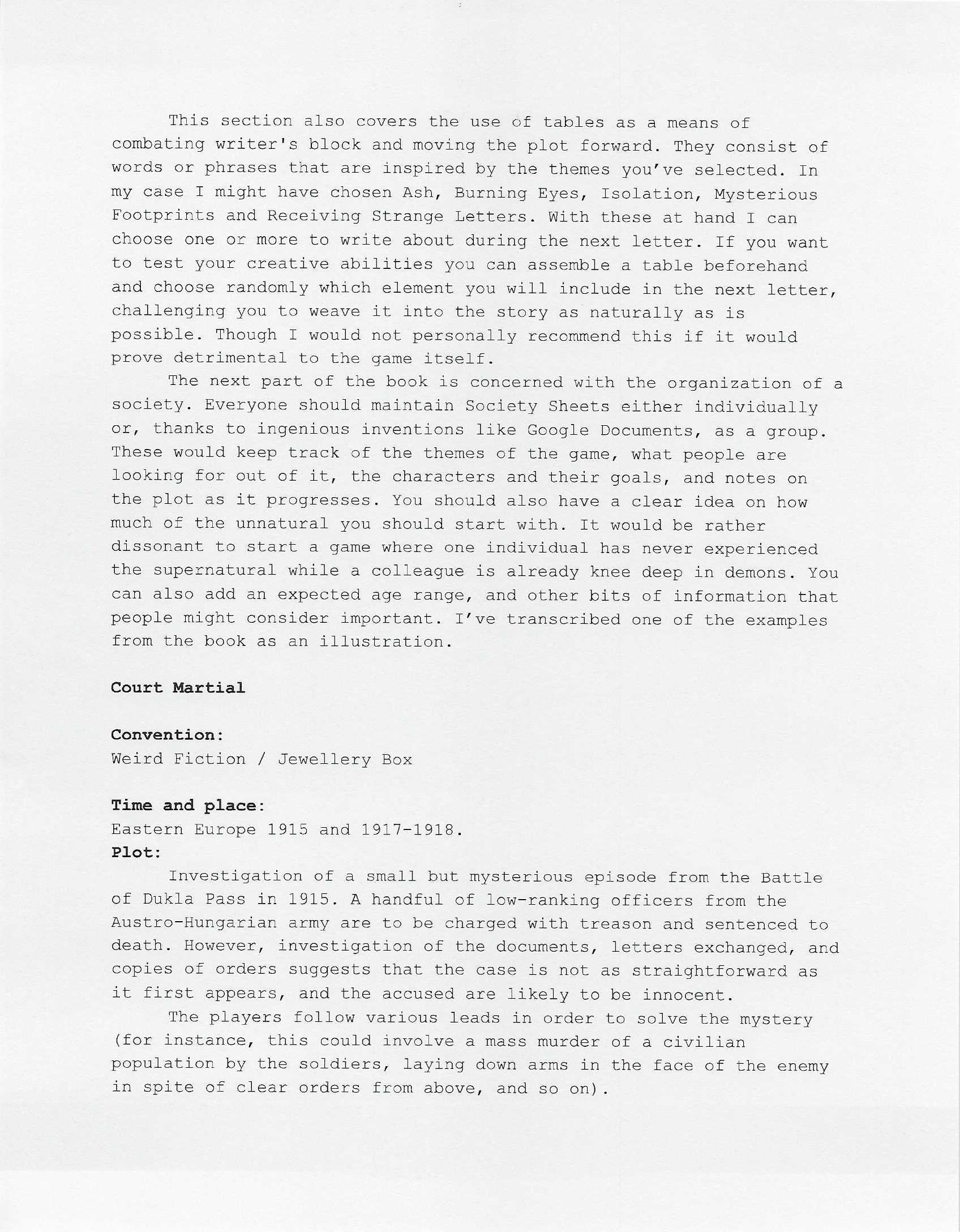
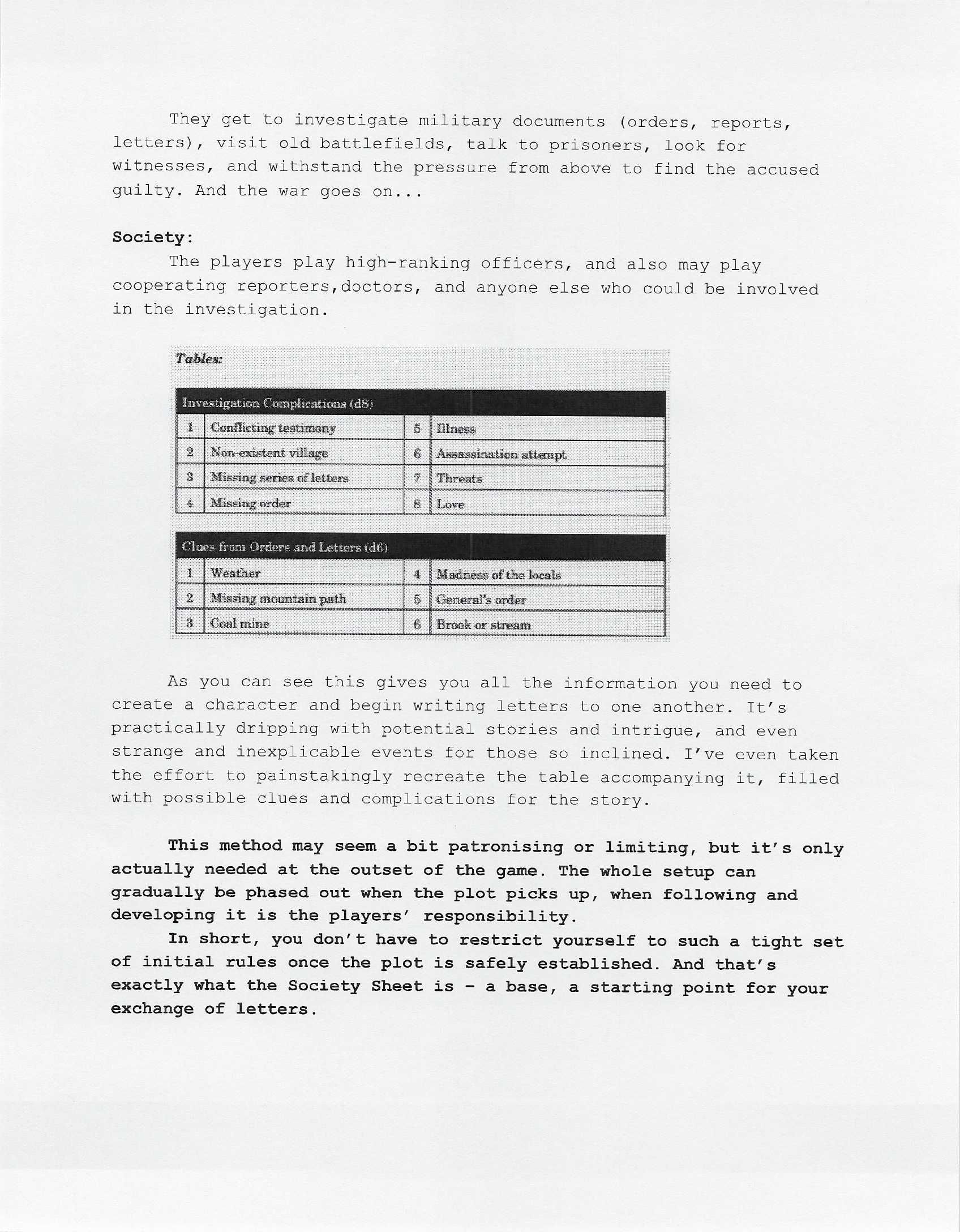
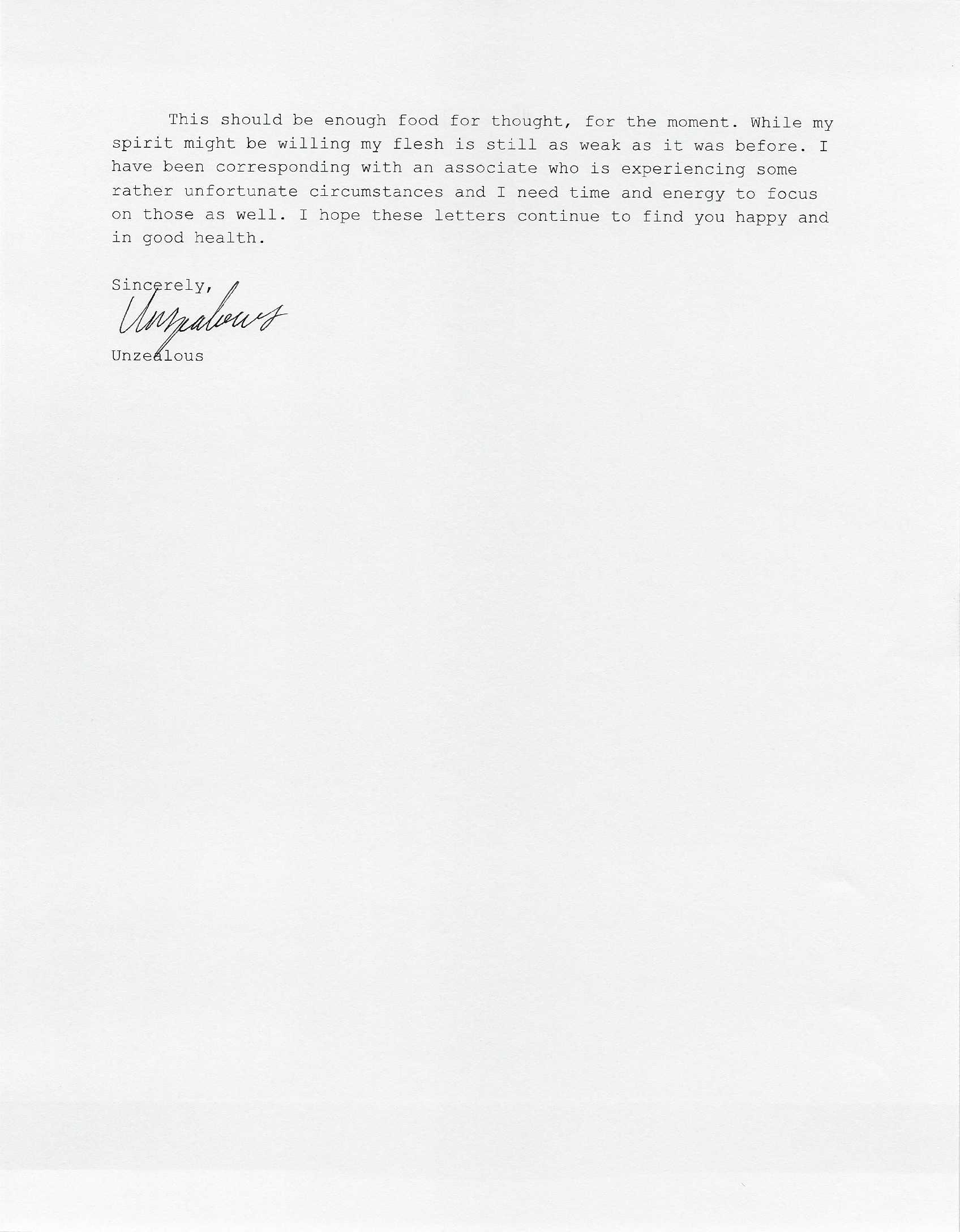
Transcript:
Dear Reader,
I am feeling a bit better as of late. Perhaps I have simply come to accept my forced isolation and am trying to focus on the situation with a positive attitude. After all, I have not had so much time to myself in months, and I have gotten a great deal of reading done. Admittedly I still have a coughing fit now and then, and I have music playing constantly in the house to drown out the deafening silence caused by the ash outside snuffing out the sounds I had become so used to. But aside from that I am in good spirits. This has to end eventually, does it not?
We appear to be at around the halfway point of the book. I pray for your continued patience as we delve ever deeper into this tome. The next section is discussing a bit of the framework involved in crafting a game. They refer to it as the Convention which is the setting, style and themes you use during the game. The theme is the core ideas you want to explore and experience. If I may be so bold as to use my current predicament it would be one of isolation and dread. The dangers I face are primarily psychological. Inside my house, I am safe. Outside, I am not. But I recognize this is not a tenable situation. You could choose anything that sits well with your group as something interesting to write about, and the book provides several examples.
For instance you could be a group of people who have come out on the wrong end of a conspiracy and are only left with questions. How much of what is happening is a coincidence and how much is the machinations of a secretive and powerful group? With each discovery you can feel them slowly turning their gaze on your group and you wonder just how far their reach extends.
Conventions also cover the style in which you communicate with one another. Once again, using my own predicament as an example, I write letters as I would to a close associate. I am careful with my word choice and try to write in an eloquent and refined manner. But this would not be appropriate in all circumstances. If your group were members of a paramilitary organization or a corporation your correspondences might look more like After Action Reports or Corporate Memos. Likewise you should remember that you are writing as your character and should write as they would, using their vocabulary and idiosyncrasies. Some people might get straight to the point in a letter while others might approach it only after exchanging greetings and updates on their life and other goings on.
This section also covers the use of tables as a means of combating writer's block and moving the plot forward. They consist of words or phrases that are inspired by the themes you’ve selected. In my case I might have chosen Ash, Burning Eyes, Isolation, Mysterious Footprints and Receiving Strange Letters. With these at hand I can choose one or more to write about during the next letter. If you want to test your creative abilities you can assemble a table beforehand and choose randomly which element you will include in the next letter, challenging you to weave it into the story as naturally as is possible. Though I would not personally recommend this if it would prove detrimental to the game itself.
The next part of the book is concerned with the organization of a society. Everyone should maintain Society Sheets either individually or, thanks to ingenious inventions like Google Documents, as a group. These would keep track of the themes of the game, what people are looking for out of it, the characters and their goals, and notes on the plot as it progresses. You should also have a clear idea on how much of the unnatural you should start with. It would be rather dissonant to start a game where one individual has never experienced the supernatural while a colleague is already knee deep in demons. You can also add an expected age range, and other bits of information that people might consider important. I’ve transcribed one of the examples from the book as an illustration.
Court Martial
Convention:
Weird Fiction / Jewellery Box
Time and place:
Eastern Europe 1915 and 1917-1918.
Plot:
Investigation of a small but mysterious episode from the Battle of Dukla Pass in 1915. A handful of low-ranking officers from the Austro-Hungarian army are to be charged with treason and sentenced to death. However, investigation of the documents, letters exchanged, and copies of orders suggests that the case is not as straightforward as it first appears, and the accused are likely to be innocent.
The players follow various leads in order to solve the mystery (for instance, this could involve a mass murder of a civilian population by the soldiers, laying down arms in the face of the enemy in spite of clear orders from above, and so on).
They get to investigate military documents (orders, reports, letters), visit old battlefields, talk to prisoners, look for witnesses, and withstand the pressure from above to find the accused guilty. And the war goes on...
Society:
The players play high-ranking officers, and also may play cooperating reporters,doctors, and anyone else who could be involved in the investigation.
As you can see this gives you all the information you need to create a character and begin writing letters to one another. It’s practically dripping with potential stories and intrigue, and even strange and inexplicable events for those so inclined. I’ve even taken the effort to painstakingly recreate the table accompanying it, filled with possible clues and complications for the story.
"This method may seem a bit patronising or limiting, but it’s only actually needed at the outset of the game. The whole setup can gradually be phased out when the plot picks up, when following and developing it is the players’ responsibility.
In short, you don’t have to restrict yourself to such a tight set of initial rules once the plot is safely established. And that’s exactly what the Society Sheet is – a base, a starting point for your exchange of letters."
This should be enough food for thought, for the moment. While my spirit might be willing my flesh is still as weak as it was before. I have been corresponding with an associate who is experiencing some rather unfortunate circumstances and I need time and energy to focus on those as well. I hope these letters continue to find you happy and in good health.
Sincerely,
Unzealous
Sixth Letter
Original SA post
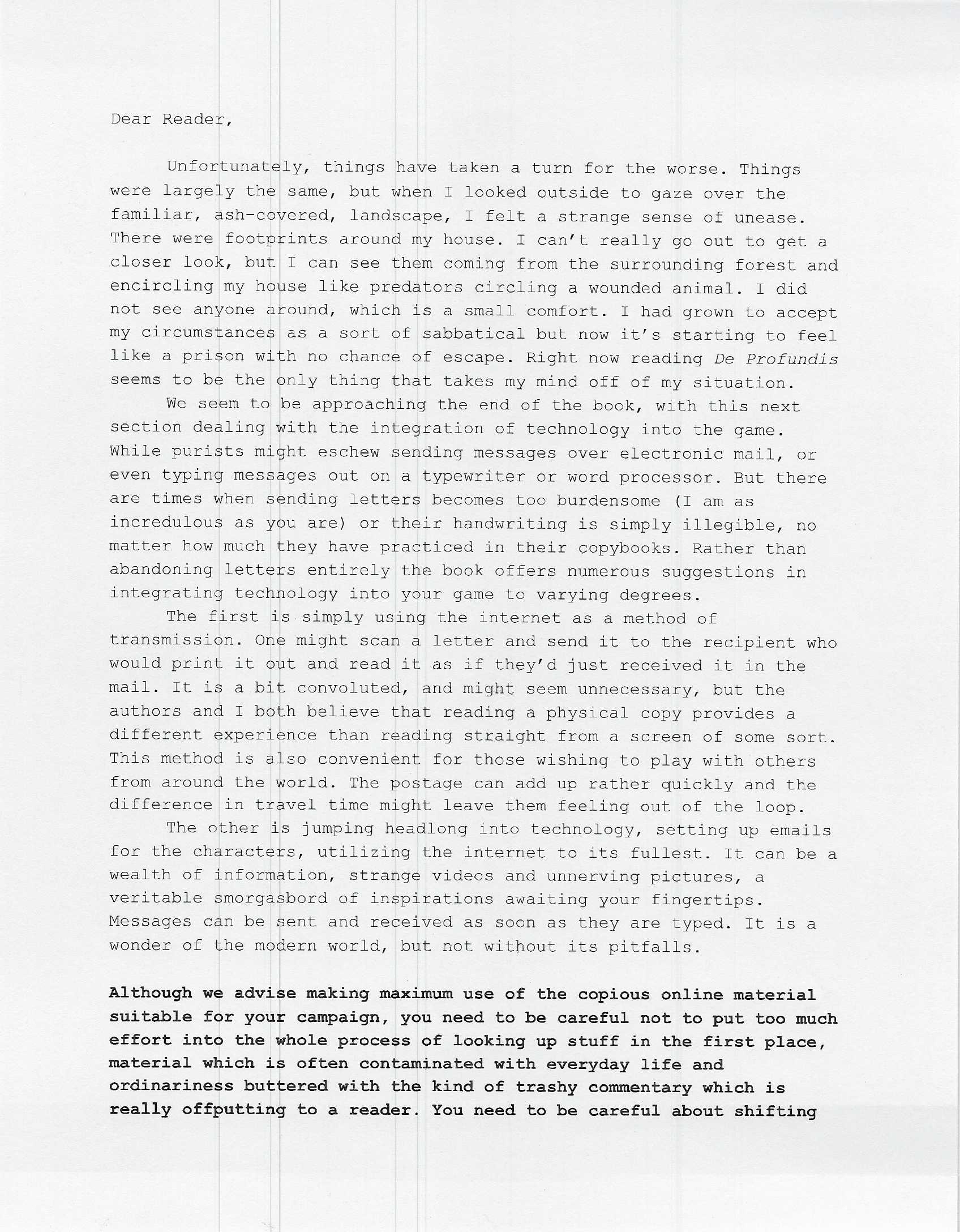
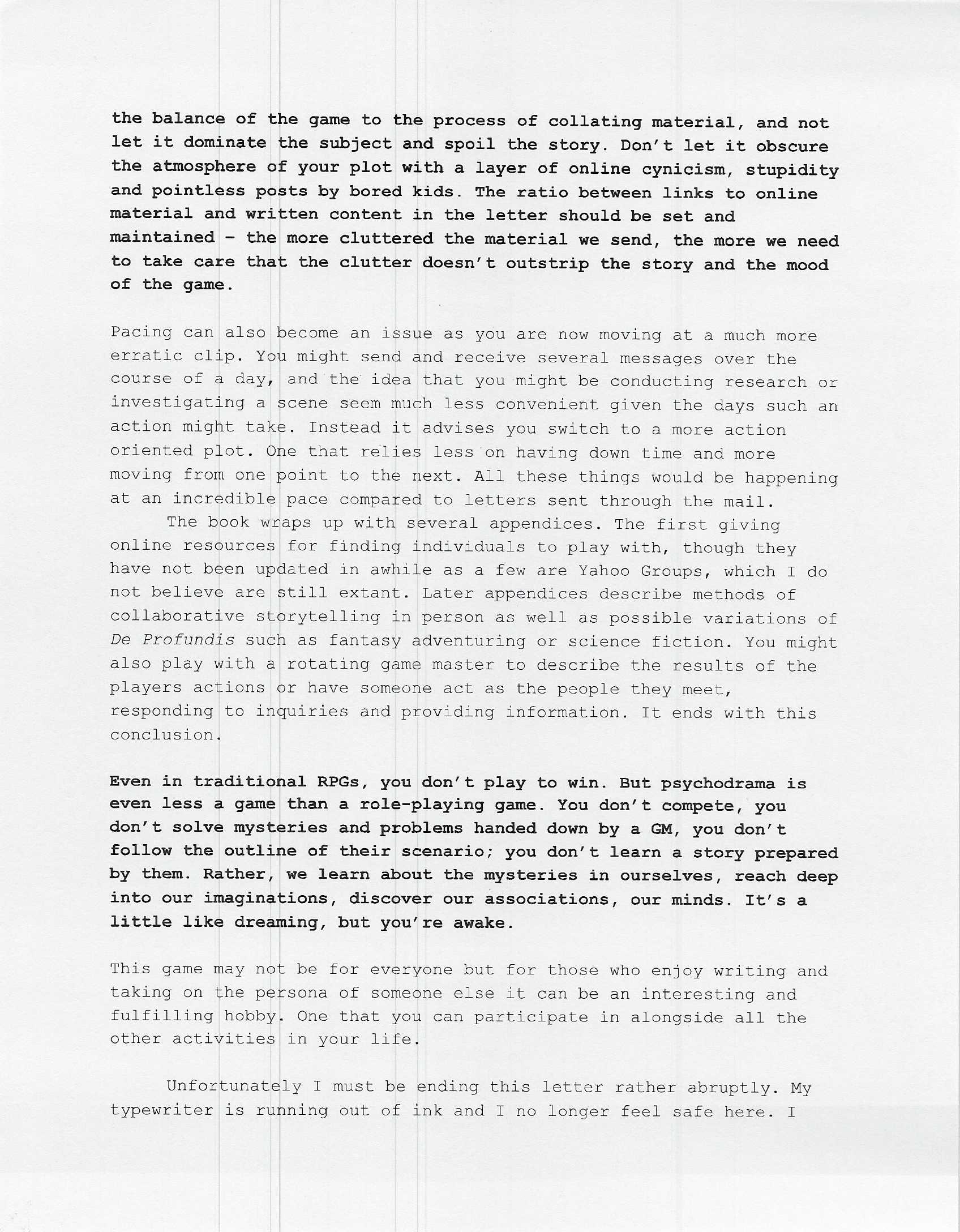
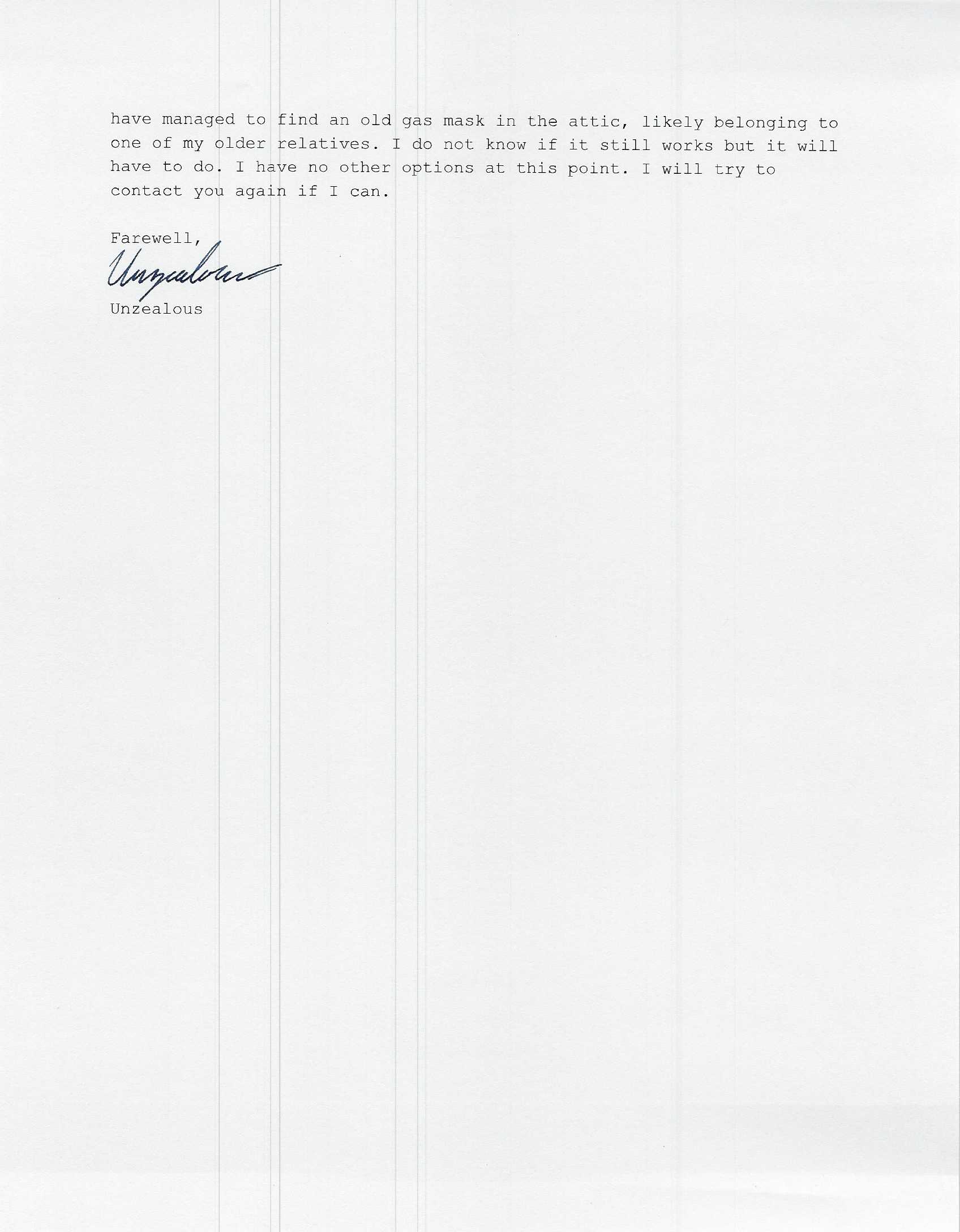
Transcript:
Dear Reader,
Unfortunately, things have taken a turn for the worse. Things were largely the same, but when I looked outside to gaze over the familiar, ash-covered, landscape, I felt a strange sense of unease. There were footprints around my house. I can’t really go out to get a closer look, but I can see them coming from the surrounding forest and encircling my house like predators circling a wounded animal. I did not see anyone around, which is a small comfort. I had grown to accept my circumstances as a sort of sabbatical but now it’s starting to feel like a prison with no chance of escape. Right now reading De Profundis seems to be the only thing that takes my mind off of my situation.
We seem to be approaching the end of the book, with this next section dealing with the integration of technology into the game. While purists might eschew sending messages over electronic mail, or even typing messages out on a typewriter or word processor. But there are times when sending letters becomes too burdensome (I am as incredulous as you are) or their handwriting is simply illegible, no matter how much they have practiced in their copybooks. Rather than abandoning letters entirely the book offers numerous suggestions in integrating technology into your game to varying degrees.
The first is simply using the internet as a method of transmission. One might scan a letter and send it to the recipient who would print it out and read it as if they’d just received it in the mail. It is a bit convoluted, and might seem unnecessary, but the authors and I both believe that reading a physical copy provides a different experience than reading straight from a screen of some sort. This method is also convenient for those wishing to play with others from around the world. The postage can add up rather quickly and the difference in travel time might leave them feeling out of the loop.
The other is jumping headlong into technology, setting up emails for the characters, utilizing the internet to its fullest. It can be a wealth of information, strange videos and unnerving pictures, a veritable smorgasbord of inspirations awaiting your fingertips. Messages can be sent and received as soon as they are typed. It is a wonder of the modern world, but not without its pitfalls.
Although we advise making maximum use of the copious online material suitable for your campaign, you need to be careful not to put too much effort into the whole process of looking up stuff in the first place, material which is often contaminated with everyday life and ordinariness buttered with the kind of trashy commentary which is really offputting to a reader. You need to be careful about shifting the balance of the game to the process of collating material, and not let it dominate the subject and spoil the story. Don’t let it obscure the atmosphere of your plot with a layer of online cynicism, stupidity and pointless posts by bored kids. The ratio between links to online material and written content in the letter should be set and maintained – the more cluttered the material we send, the more we need to take care that the clutter doesn’t outstrip the story and the mood of the game.
Pacing can also become an issue as you are now moving at a much more erratic clip. You might send and receive several messages over the course of a day, and the idea that you might be conducting research or investigating a scene seem much less convenient given the days such an action might take. Instead it advises you switch to a more action oriented plot. One that relies less on having down time and more moving from one point to the next. All these things would be happening at an incredible pace compared to letters sent through the mail.
The book wraps up with several appendices. The first giving online resources for finding individuals to play with, though they have not been updated in awhile as a few are Yahoo Groups, which I do not believe are still extant. Later appendices describe methods of collaborative storytelling in person as well as possible variations of De Profundis such as fantasy adventuring or science fiction. You might also play with a rotating game master to describe the results of the players actions or have someone act as the people they meet, responding to inquiries and providing information. It ends with this conclusion.
Even in traditional RPGs, you don’t play to win. But psychodrama is even less a game than a role-playing game. You don’t compete, you don’t solve mysteries and problems handed down by a GM, you don’t follow the outline of their scenario; you don’t learn a story prepared by them. Rather, we learn about the mysteries in ourselves, reach deep into our imaginations, discover our associations, our minds. It’s a little like dreaming, but you’re awake.
This game may not be for everyone but for those who enjoy writing and taking on the persona of someone else it can be an interesting and fulfilling hobby. One that you can participate in alongside all the other activities in your life.
Unfortunately I must be ending this letter rather abruptly. My typewriter is running out of ink and I no longer feel safe here. I have managed to find an old gas mask in the attic, likely belonging to one of my older relatives. I do not know if it still works but it will have to do. I have no other options at this point. I will try to contact you again if I can.
Farewell,
Unzealous
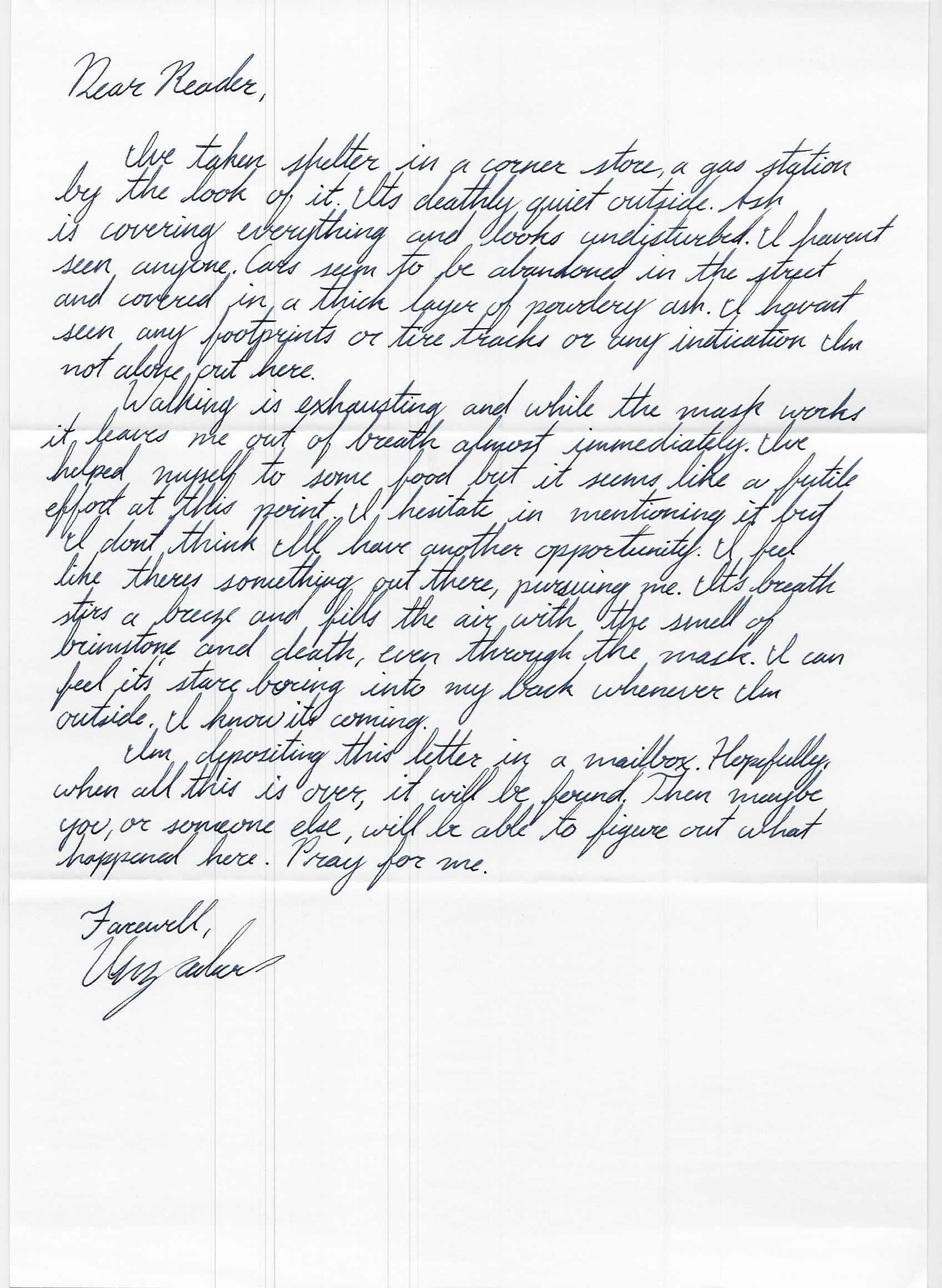
Transcript:
Ive taken shelter in a corner store, a gas station by the look of it. It's deathly quiet outside. Ash is covering everything and looks undisturbed. I haven't seen anyone. Cars seem to be abandoned in the street and covered in a thick layer of powdery ash. I haven't seen foorprints of tire tracks or any indication I'm not alone out here.
Walking is exhausting and while the mask works it leaves me out of breath almost immediately. I've helped myself to some food but it seems like a futile effort at this point. I hesitate in mentioning it but I don't think I'll have another opportunity. I feel like there's something out there, pursuing me. It's breath stirs a breeze and fills the air with the smell of brimstone and death, even through the mask. I can feel its stare boring into my back whenever I'm outside. I know it's coming.
I'm depositing this letter in a mailbox. Hopefully when all this is over, it will be found. Then maybe you, or someone else, will be able to figure out what happened here. Pray for me.
Farewell,
Unzealous